#when a white person does something it's a Profound Moral Lesson
Explore tagged Tumblr posts
Text
#kind of fucking awful that a) nathan knows that this is awful and shuts it down immediately #but also b) does not similarly naturally intuit that jade treating him like shit when she ~really~ liked him was also awful (tags via @obstinatecondolement)
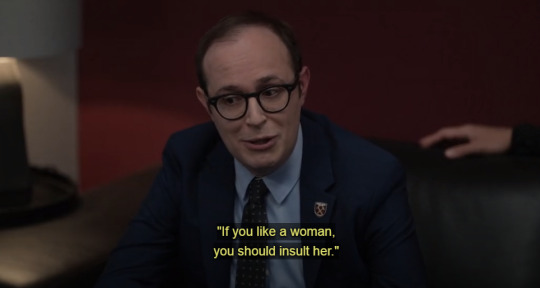
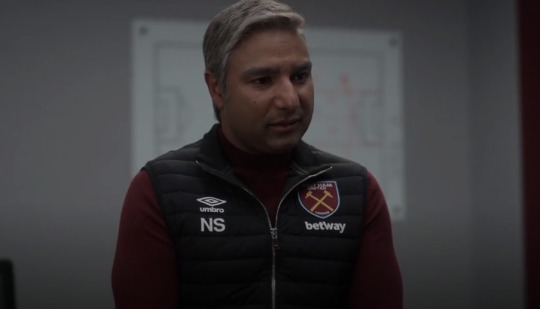

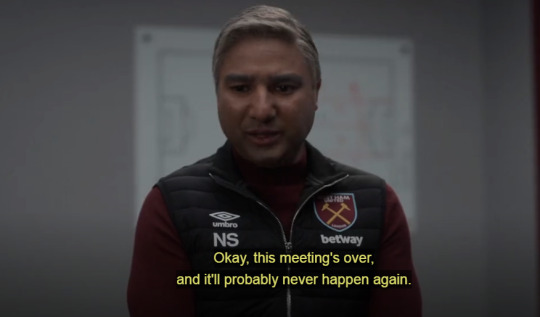
#ted lasso#nathan shelley#this is a taste of athens hate blog#nathan has internalized the core message of the series#when a brown person does something it's bad#when a white person does something it's a Profound Moral Lesson#and when that white person is a thin conventionally attractive woman it doubles as a Masterclass on Girlboss Feminism#emphasis on the word 'master'
425 notes
·
View notes
Text
The Last Word: Shirley Manson on Fighting the Patriarchy and How Patti Smith Inspires Her
The Garbage singer also talks racial justice, living for now, and why legacy is an inherently masculine concern
Almost as soon as Garbage’s self-titled debut blew up overnight in 1995, their singer, Shirley Manson, became aware of the patriarchy running the music industry. Even though she was the group’s focal point — belting dusky electro-rock songs about making sense of depression (“Only Happy When It Rains”) and taking pride in nonconformity (“Queer”) — she was still a woman fronting a band of men, one of whom, Butch Vig, had produced Nirvana’s Nevermind. Almost immediately, she felt as though her role in the group was being devalued — not by the guys she worked with, but externally.
“There was a lot of stuff written about me in the music press, and that’s when I started to realize how I’m being diminished, how, in some cases, I’m being completely eradicated from the narrative because I’m female and not a man,” she says now. “I was talked over by lawyers; I was ignored by managers. The list goes on. It’s boring and tedious; there’s no point in me moaning about it now, but certainly, that was my awakening.”
That revelation emboldened her to speak out about equality and she quickly became a feminist icon, using her platform to bring attention to human rights, mental health, and the AIDS crisis. All the while, she wrote inclusive hit songs with Garbage about androgyny and reproductive rights (“Sex Is Not the Enemy”). On Garbage’s great new album, No Gods No Masters, she grapples with racial injustice, climate change, the patriarchy, and her own self-worth. But as weighty as the subject matter is, she approaches each song in her own uniquely uplifting way.
“I don’t think really the record is serious, per se,” the singer, 54, says, on an early May phone call. “I think it’s an indignant record. I think in indignance you can still carry humor with you, as well as softness, kindness, and love in your heart. I just felt it would be inauthentic to say anything other than what I was saying in my daily life across the dinner table from my friends and my family. I think as you get older as an artist, the challenge is, ‘How I can be my most authentic self?’ because that’s the most unique story I can tell. In an industry that’s just absolutely jam-packed to the rafters with ideas, opinions, melodies, and so on, you can’t afford to be anything other than your most authentic self. It won’t last.”
Authenticity and being true to herself are the qualities that have made Manson who she is. And those traits seem to guide her answers to Rolling Stone’s questions about philosophy, life lessons, and creature comforts for our Last Word interview.
What are the most important rules that you live by? I’m 54, which is ancient for the contemporary music industry. At this point, I feel like if it’s not fun, then I’m uninterested entirely. If somebody’s treating me poorly, I have to walk away. Life is so fricking short, and I’m three quarters of the way through mine already; I just want to have a good life, full of joy.
Who are your heroes and why? Patti Smith is a huge hero for me for a lot of different reasons. Most importantly, it’s because she’s a woman who has navigated her creative life so beautifully and so artfully, with such integrity and authenticity, and she has proven to me that a woman, an artist, does not have to subscribe to the rules of the contemporary music industry.
It’s very rare for other women to see examples of women actually working still in their seventies. That, to me, is really thrilling and really inspiring, and it fills me with hope. At times when you come up against the ageism, sexism, and misogyny that exists in our culture, I always try and picture Patti in my mind’s eye, and it always brings me back to center, like, “OK, adhere to your own rules. Design your own life. Be your own architect. You can continue to be an artist the rest of your life.” And to me, that’s life. That is a fully lived life.
You’re also a role model yourself. How do you handle that responsibility? I’m a bit speechless if the truth be told. I realize that I’ve now enjoyed a long career in music, and by default, I think people are inspired by that. I think whenever you see an artist, no matter who they are, when someone can endure, I think that’s exciting to everybody else, because it’s a message that says, “You too can get up when you think you’re done. You too can brush yourself off and try again.” By just continuing, you can help other people continue and fulfill themselves in ways that they thought they wouldn’t be able to.
I try to be a decent person. I make mistakes. I fuck people off. I say stupid shit. I’m not all-knowing; I am ignorant in so many ways. But I do try my best. I think that’s really all I can ask of myself.
How others perceive me is absolutely out of my control. There’s always going to be people who think I’m an arsehole, and that’s just part and parcel of being in the public eye. People are just going to hate on you, so I try not to take too much of it in; I don’t let it absorb me too much. I have gotten to that point in my life when I’m able to just go, “You know what? Fuck it. You can’t win them all.”
You once said that the idea of legacy was a masculine construct that you don’t believe in. Do you still feel that way? Yeah. I still very much believe in that. I know a lot of male artists who bang on about their legacy and their importance. Not to knock that if that’s what’s important to you but for me personally, what do I care? I’m going to be dead and gone and totally unconscious of any so-called legacy that I might leave behind. I want fun now. I want to have a good life now. I want to eat good food now and have great sex. It’s absolutely meaningless to me what happens after I’m gone. I want to use my time wisely, and that’s all that I really am concerned with, to be honest.
What is it about legacy that’s inherently masculine? This is armchair psychology, so please forgive me, but I’m sure it has something to do with how women have this uterus that can bear children. I think that’s profound. One of the few gifts that men have not been given is that ability to create with your body, and your blood, and your heat and all these nutrients from your body. Perhaps that’s one of the reasons why you don’t hear as many women banging on about the great legacy they’re going to leave behind. I think for women it’s their kids.
You’re Scottish. What is the most Scottish thing about you these days? I’ve got a lot of grit, and it’s served me really well in my career. I think that is a really Scottish trait. The Scottish people are tough, and they also have a good sense of humor. So, grit with humor. I should say “gritted with humor,” in the same way we grit roads.
As you were saying “grit,” it occurred to me that a lot of your songs are about survival and moving forward, going back to “Stupid Girl” or “Only Happy When It Rains.” They’re about perseverance. [Pauses] I think it’s funny you should say that because I’m just sort of like, “Wow, he might be right.” I do think that a huge theme for me is, “How do you overcome? How do we all overcome?” Things can be great for a while; things will not be great forever. And to every single life, these challenges appear. We all have to reconfigure ourselves in order to try to hurl ourselves over obstacles in order to have the kind of life we hope for. So I do think you’ve shocked me a little by discovering a theme for me. Yay, I feel thrilled. I have a theme. It’s exciting.
“Waiting for God” is one of my favorite songs on the album because of the way you address racial justice. How can we, as a society, fight white indifference? You know, that’s a question right there. It’s interesting that you use the words “white indifference,” because one of the things that shocked me so greatly is the ambivalence and the apathy of white people all over the world who are seeing what we’re seeing on our TVs and on the internet, and yet not having the moral courage to speak up. I think the most important thing we can do is pull back the carpet to see the mess on the floor in order for us to actually start cleaning it up.
If we could curtail some of the brutality of police against black people, that would be a good start. I think it’s going to be decades and decades and decades before we can start to really equalize our societies so that everyone is enjoying the spoils of Western wealth over in the developing world. It’s necessary that we try and help these countries that aren’t as powerful or as wealthy. It’s good for the whole world if we start to improve situations for everyone. Nobody will lose anything, and everyone has everything to gain.
But if I had the answers to how we go about fixing it, I would be in politics and not in music. I just know what I believe to be right, and I’m doing my best to use my voice to try and encourage my friends, my little ecosystem, to start with paying attention and supporting black businesses and elevating black voices and black talent.
What’s your favorite book? I have so many. The one that springs to mind would be American Pastoral by Philip Roth. I loved All the Pretty Horses by Cormac McCarthy. I loved The Collected Works of Billy the Kid by Michael Ondaatje. I loved Winnie the Pooh and Wuthering Heights. I’ve got so many that have really stuck with me that are classics.
My most favorite recent book that I’ve just finished reading is Dancer by Colum McCann about [Russian ballet dancer Rudolf] Nureyev. I was just absolutely mesmerized by it. It was just such a fantastic read, and he’s such a miraculous writer. He brought out Apeirogon last year about the struggle in between Palestine and Israel. He talks about this complicated mess with such clarity, kindness, and generosity. I couldn’t believe Apeirogon didn’t get more fuss made of it last year. Somehow it just seemed to get buried in the morass of other books, and of course the suffering that Covid had brought upon the earth.
What advice do you wish you could give your younger self? “Take up your space.” When I was growing up, to be a girl was to be told to minimize the space you took up: “Close your legs. Don’t be loud. Smile. Be cute. Be attractive. Be pleasing.” I inherently balked against that as a kid. I was a rebellious kid, and I wasn’t going to sit in the corner and be quiet. I’ve never been like that. However, looking back, I still notice some of the patterns of my own compliance. It’s not that I hate myself for it, but I just wish I could turn around and say to my young self, “Take your seat. If there’s not a seat there, drag a seat up to the table and sit down.”
I’m still really aware of the sexism and misogyny that I have had to battle throughout my career. I’m not crying, “Woe is me,” because I’ve obviously flourished in my career, and it obviously didn’t hold me back enough to hamper me in any way. But I feel for all the women who were unlike me, who didn’t have my forcefulness of personality, or my education, or my ability to articulate myself. I want that for all people, though; I want all people to stop trying to please, and accept that some people will like that, and some people won’t, and that’s OK. It’s OK that some people just don’t dig you.
On the topic of gender, I got a kick out of your song “Godhead,” where you ask if people would treat you differently “if I had a dick.” I’m really proud of that song, because I think it’s talking about something really serious, and it’s really fun. It’s about addressing the patriarchy, and how omnipresent it is. When I was young, I was so busy trying to make it, I didn’t see that there was a patriarchy in place. And it’s only as an adult, I start looking back going, “Oh, wow — when that A&R man told me to my face that he wanked over pictures of me, that was really uncool.” But at the time, you kind of laugh it off and just press on.
I was oblivious to it. In this song, I’m talking about how patriarchy bleeds into absolutely everything, specifically under organized religion. The “Godhead” is the male, and we are all under the godhead forever, and that’s unquestioned, and how crazy is that? Because a dude holds a higher position in society, because he’s got a dick and a pair of balls. Often, these balls are smaller than my own [laughs].
It just gets silly after a while, when you watch other men protect other men just for the sake of protecting the patriarchy. So few men are willing to speak up about bro culture and call into question the behavior of the men they are associated with. There’s just a reluctance by men to address this absolutely shocking, terrifying, depressing, pathetic assault by men of other people’s bodies.
In 1996, your bandmate Butch Vig said about you, “So many singers screamed to convey intensity, and she does the opposite. It just blew us away.” How did you come up with that approach? I don’t know. I’ve found that when people speak to me quietly, I feel the most threatened because I’m really comfortable with conflict. I thrive on conflict. It excites me in a funny way. When people are shouting, I don’t feel scared. I like to shout back; that’s just how my family were. We’d just start to shout at each other all the time. I’m not scared of elevated temper. For me, when people get really quiet, that’s when I know they’re really serious, because they’re in control of their rage, and that’s when they’re most deadly.
The last question I have is a shallow one. I love being cheap and superficial.
What’s the most indulgent purchase you’ve ever made? At the height of my success, I hired a person who would shop for me and then send everything in a big box to my hotel room. I would choose what I wanted and return anything else. One day, this beautiful pair of Italian leather boots arrived. I wore a pair very similar in the “Stupid Girl” video, and I thought, “Oh, yeah, these are really me. I’m going to keep these. These are amazing.” It was only when I got back from tour, I found out they cost $5,000. I can’t even laugh about it. It makes me so crazy. I still have these boots. I’d like to get rid of them just so that I never have to look at them again, but there they are every day, warning me of my own greed.
2 notes
·
View notes
Text
Castle of Delusion: The theft of the 2020 caucus and the liberal worship of failure
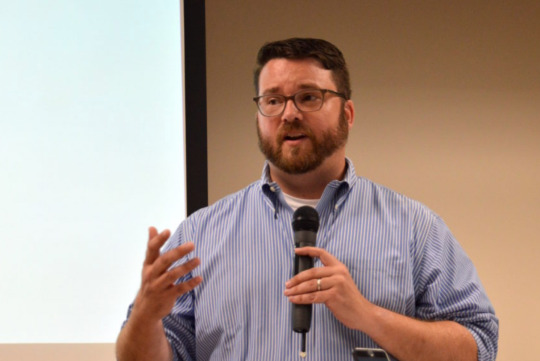
I attended Iowa Democratic caucuses in 2000, 2004, 2008, and then 2020. I’ll spare you the narrative details, but immediately after Monday’s caucus I remarked about how smoothly the new system ran. The cumbersome head count voting process of past years was replaced with an easily grasped card system that allowed supporters of viable candidates to leave after casting their fist vote (previously, they’d have to stay through re-alignment and a second head count, a process that took us about 3 hours in 2008). So cards were easier, clearer, and came with the added bonus of a paper trail. Things seemed great.
In my precinct, Sanders tied delegate-wise with Pete and Biden. This precinct was, even by Iowa’s august standards, incredibly old and incredibly white, so a tie for Bernie boded very well. Everyone was convivial. Aside from the Yang supporters being unable to perform basic arithmetic after the initial vote, there were no delays or hitches. Sure, no one knew how the reporting app was going to work—information regarding as much had never materialized, in spite of repeated promises that they’d be on top of it—but it was figured that the county chair would simply report the votes via telephone, as had been the process as far back as everyone could remember.
Post-caucus, my stomach was shot and I was as emotionally drained as I’d ever been, so I got back to my parent’s house and commenced playing video games—staying away from social media and cable news until I could be certain the results had been called. Come midnight, I saw what everyone else saw: something bad had happened, something no one could quite describe, and so they weren’t going to release votes that night. Rachel Maddow’s weird gross skeleton face was beaming with relief: this is great news for the party, she said, because it was great news for Michael Bloomberg. I commenced to get blackout drunk and post threats on social media.
At first, I went against my personal experience (and intuition, and common sense) and blamed the failure on run-of-the-mill incompetence. We are now, however, more than 40 hours past the point when most votes were cast, and 24 hours past the Polk County chair confirming that his results—in one of Iowa’s largest districts, where Sanders was projected to dominate—had been submitted. The state party is simply refusing to count votes. They are rigging their own election, disenfranchising their own voters.
I’m not going to speculate on the strategic thinking of the mental defectives who have risen to leadership positions with state and national Democratic parties. Maybe they’ll never count the Polk County votes. Maybe they’ll only do so weeks from now, so as to deny Sanders any momentum and allow that rat-faced piece of shit Mayor Pete to continue to falsely claim victory. Maybe this is meant to protect the Biden campaign from total collapse. Maybe it’s meant to boost Bloomberg. Who knows, who cares. The point is, these people are cheating in plain sight. They are doing so brazenly. They are literally refusing to count the votes of members of their own party so as to squelch an election result they find unfavorable.
Partisan corruption is nothing new, and certainly not exclusive to the contemporary Democratic party. What’s striking about this, however, is the nakedness of both its machinations and the disdain the party is showing to its own voters. Yes, Mayor Daley most likely destroyed Nixon votes to shore up Illinois for Kennedy. Yes, the Bush campaign ginned up astroturf protests to prevent a full recount in Florida. Yes, the AP called the entire primary for Hillary the day before California was set to vote, so as to depress turn out. All of these acts were disgusting, the sort of raw cynicism that destroys the few remaining vestiges of legitimacy of this awful and broken country of ours. But all of these were done to seize power. They all contained some element of deniability, some sense of awareness of the need to control public perception, to not so obviously telegraph the actors’ hatred toward democracy.
The theft of the 2020 Iowa Caucus is, in short, an act so proudly and openly corrupt that it has no fair parallel in modern American history. No reasonable observer can conclude anything other than that the Democratic party is run by some of the stupidest and most corrupt people alive. And the fact that the party does not seem to realize this is a profound indictment of how deeply our few remaining liberal institutions are in the grip of a sort of suicidal delusion, a form of illiberal madness that worships its own destruction.
The only reasonable question is how? How did the Democratic party and its media allies come to be dominated by idiots who derive psychological gratification from failure, people whose hubris and self-certainty is so strong they think everyone else is dumb enough to not see that they’re cheating in plain sight?
Like many other of the most malignant aspects of contemporary liberalism, this suicidal delusion was born in the darkest corners of academe. The thrust of the last few decades of cultural studies has been to demand that people reject understandings of the world that are traditional, intuitive, and commonsensical—even when these understandings aren’t materially malignant, and especially when they are backed up through empirical measurements.
Sometimes this has led to what most decent people would consider progress. It’s good, for example, that we’ve destigmatized homosexuality. But many more assertions—particularly those that have been argued for the most viciously throughout the last decade or so—are either objectively untrue or so far divorced from the lived reality of most people that very few of us actually believe them. Most people don’t believe that there exist no biological differences between men and women, for example, or that fatness doesn’t come with health consequences and/or isn’t correlated with diet and exercise. We don’t honestly believe that whiteness is a metaphysical force that is the true cause of all the world’s problems, nor that an implicit bias test is a fair measurement of anything, nor that person’s worth is more a matter of their collective identity markers than of their beliefs and actions. These assertions are all incredibly fringe, despicable to anyone who cares about empirical reality or possesses a moral compass that’s not founded entirely in self-serving relativism.
There exists a small caste of delusionists, however, who have forged careers from making these and other assertions. They are very prominent within their own, closed circles, and they receive no material pushback for their beliefs, even from the vast majority of people who have not been initiated into their cult. This is due to the solipsistic validation mechanisms of contemporary cultural studies, a milieu which suggests, simply, that its purveyors are right, everyone who doesn’t defer to them is some variety of fascist, and the fact that disagreement exists is fundamental proof of the righteousness of their claims. To members of this caste, delusion isn’t merely a virtue; it’s a currency. The more they anger and confuse outsiders, the more correct and admirable they become, and the higher their position of prominence within liberal institutions.
This is the lesson of the “Sokal Squared” hoax, in which a team of authors managed to get several nonsense articles past peer reviewers at cultural studies journals, making arguments which ranged from incredibly offensive to beyond the realm of plausibility. Or, if you’ve fallen for the woke apologia and believe these works to be unworthy of consideration, let’s look at a more earnest piece, in which an author argues that drone bombing “queers” warfare. It’s reductive to merely call these arguments stupid. They are delusional. They are absurd and offensive in manner that’s all but guaranteed to confuse and anger a large majority of people. They go against basic common sense and decency and can in most cases be disproven empirically—and that’s exactly why they got through peer review so easily. The value here isn’t in attempting to adjudicate reality or even morality; it’s instead found in giving its purveyors a chance to revel in one another’s unboundedness to reality. Radicalism can no longer be differentiated from simple stupidity. The point is to announce one’s membership in the delusional caste. It’s good to be insane. It’s good to be revolting. It’s good to fail, because then you know you’re good.
The caste’s members eventually reach a plane of delusion so all-encompassing that they begin to disdain those of us who still possess a desire to engage with the world in honest or rational terms. These people—the hoard, the uninitiated, the rubes—they only exist to confirm the righteousness of the insiders. What they think they see therefore doesn’t matter. Their opinions don’t matter. Their votes, especially, do not matter. We’ll tell them what to think. We’ll tell them how the world exists. And if they disagree, well, that’s just evidence of how wrong they are...
70 notes
·
View notes
Text
Begin Again: James Baldwin’s America and Its Urgent Lessons for Our Own by Eddie S. Glaude Jr.

Baldwin’s understanding of the American condition cohered around a set of practices that, taken together, constitute something I will refer to throughout this book as the lie. The idea of facing the lie was always at the heart of Jimmy’s witness, because he thought that it, as opposed to our claim to the shining city on a hill, was what made America truly exceptional. The lie is more properly several sets of lies with a single purpose. If what I have called the “value gap” is the idea that in America white lives have always mattered more than the lives of others, then the lie is a broad and powerful architecture of false assumptions by which the value gap is maintained. These are the narrative assumptions that support the everyday order of American life, which means we breathe them like air. We count them as truths. We absorb them into our character. (p. 7)
***
These, then, are the twined purposes at the heart of Baldwin’s poetic vision. He is not only motivated to transform the stuff of experience into the beauty of art; as a poet he also bears witness to what he sees and what we have forgotten, calling our attention to the enduring legacies of slavery in our lives; to the impact of systemic discrimination throughout the country that has denied generations of black people access to the so-called American dream; to the willful blindness of so many white Americans to the violence that sustains it all. He laments the suffering that results from our evasions and refusals and passes judgment on what we have done and not done in order to release ourselves into the possibility of becoming different and better people. He bears witness for those who cannot because they did not survive, and he bears witness for those who survived it all, wounded and broken. (p. 40)
***
In the end, we cannot escape our beginnings: The scars on our backs and the white-knuckled grip of the lash that put them there remain in dim outline across generations and in the way we cautiously or not so cautiously move around one another. This legacy of trauma is an inheritance of sorts, an inheritance of sin that undergirds much of what we do in this country. (p. 46)
***
When we memorialize the Confederacy with monuments to Robert E. Lee and “Stonewall” Jackson, what exactly are we commending? It’s never simply the military genius of a general. . . . The Confederate monuments are memorials to a way of life and a particular set of values associated with that way of life. To suggest they are not is just dishonest. The students at Princeton asked a similar question about Woodrow Wilson: What does the university’s uncritical celebration of him commend to us? Again, who and what we celebrate reflects who and what we value. This is why in moments of revolution or profound cultural shifts one of the first things people remove are symbols of the old values. Lenin’s and Stalin’s statues, for example, had to fall, but it is telling that Robert E. Lee continues to stand tall in parks across the United States—even in Charlottesville, Virginia, where Heather Heyer died. (p. 79)
***
An honest confrontation with the past had everything to do with the kinds of persons we understood ourselves to be and the kinds of people we aspired to become. Baldwin’s demand was a decidedly moral one: He wanted to free us from the shackles of a particular national story in order that we might create ourselves anew. For this to happen, white America needed to shatter the myths that secured its innocence. This required discarding the histories that trapped us in the categories of race. “People who imagine that history flatters them,” he wrote in Ebony, “are impaled on their history like a butterfly on a pin and become incapable of seeing or changing themselves, or the world.” (p. 82)
***
Even though Baldwin understood Black Power, its condemnation of white America, and its insistence on black self-determination as a reasonable and, in some ways, wholly justifiable response to the country’s betrayal of the civil rights movement, he never rejected the idea, found in this formulation, that we are much more than the categories that bind our feet. We, too, must never forget this insight.
“Color,” as he wrote in 1963, “is not a human or personal reality; it is a political reality.” Color does not say, once and for all, who we are and who we will forever be, nor does it accord anyone a different moral standing because they happen to be one color as opposed to another. But, again, Baldwin is not naïve. He understands history’s hold and the politics that make it so. As he wrote in The Fire Next Time, “as long as we in the West place on color the value that we do, we make it impossible for the great unwashed to consolidate themselves according to any other principle.” It makes all the sense in the world, then, that black people would look to the fact of their blackness as a key source of solidarity and liberation. White people make black identity politics necessary. But if we are to survive, we cannot get trapped there. (pp. 101-02)
***
Baldwin came to understand that there were some white people in America who refused to give up their commitment to the value gap. For him, we could not predicate our politics on changing their minds and souls. They had to do that for themselves. In our after times, our task, then, is not to save Trump voters—it isn’t to convince them to give up their views that white people ought to matter more than others. Our task is to build a world where such a view has no place or quarter to breathe. I am aware that this is a radical, some may even say, dangerous claim. It amounts to “throwing away” a large portion of the country, many of whom are willing to defend their positions with violence. But we cannot give in to these people. We know what the result will be, and I cannot watch another generation of black children bear the burden of that choice. (pp. 112-13)
***
To understand this is to see why the desire to distance oneself from Trump fits perfectly with the American refusal to see ourselves as we actually are. We evade historical wounds, the individual pain, and the lasting effects of it all. The lynched relative; the buried son or daughter killed at the hands of the police; the millions locked away to rot in prisons; the children languishing in failed schools; the smothering, concentrated poverty passed down from generation to generation; and the indifference to lives lived in the shadows of the American dream are generally understood as exceptions to the American story, not the rule. Blasphemous facts must be banished from view by a host of public rituals and incantations. Our gaze averted, we then congratulate ourselves on how far we have come and ruthlessly blame those in the shadows for their plight in life. Gratitude is expected. Having secured our innocence, we feel no guilt in enjoying what we have earned by our own merit, in defending our right to educate our children in the best schools and in demanding that we be judged by our ability alone. To maintain this illusion, Trump has to be seen as singular, aberrant. Otherwise, he reveals something terrible about us. But not to see yourself in Trump is to continue to lie. (pp. 173-74)
***
I have taken the title of this book from a passage in James Baldwin's last novel, Just Above My Head. In light of the collapse of the civil rights movement and the consolidation of the after times with the election of Ronald Reagan, Baldwin offered these words for those who desperately sought to imagine a way forward: “Not everything is lost. Responsibility cannot be lost, it can only be abdicated. If one refuses abdication, one begins again.” Begin again is shorthand for something Baldwin commended to the country in the latter part of his career: that we reexamine the fundamental values and commitments that shape our self-understanding, and that we look back to those beginnings not to reaffirm our greatness or to double down on myths that secure our innocence, but to see where we went wrong and how we might reimagine or re-create ourselves in light of who we initially set out to be. This requires an unflinching encounter with the lie at the heart of our history, the kind of encounter that cannot be avoided at places like the Legacy Museum.
Irony abounds. The National Memorial for Peace and Justice opened in 2018, in the middle of Donald Trump’s first term. As I have argued, Trump's election represents our after times; all that he stands for reasserts the lie in the face of demographic shifts and political change represented by Obama’s election and the activism of Black Lives Matter. Every day Trump insists on the belief that white people matter more than others in this country. He has tossed aside any pretense of a commitment to a multiracial democracy. He has attacked congressmen and women of color, even telling four congresswomen “to go back to the countries they came from”; scapegoated people seeking a better life at our borders; and appealed explicitly to white resentment. On top of the racist rhetoric, his judicial appointments and his policies around voting rights, healthcare, environmental regulations, immigration law, and education disproportionately harm communities of color. In every way imaginable, Trump has intensified the cold civil war that engulfs the country.
But to view Trump in the light of the lynching memorial in Alabama is to understand him in the grand sweep of American history: He and his ideas are not exceptional. He and the people who support him are just the latest examples of the country's ongoing betrayal, our version of “the apostles of forgetfulness” When we make Trump exceptional, we let ourselves off the hook, for he is us just as surely as the slave-owning Founding Fathers were us; as surely as Lincoln, with his talk of sending black people to Liberia, was us; as surely as Reagan was us, with his welfare queens. When we are surprised to see the reemergence of Klansmen, neo-Nazis, and other white nationalists, we reveal our willful ignorance about how our own choices make them possible. The memorial confronts both Trumpism and those who would never imagine themselves in sympathy with it, with the truth and trauma of American history. It exposes the lie for what it is and makes plain our collective complicity in reinforcing it.
In his introduction to his 1985 collection of essays, The Price of the Ticket, Baldwin noted that America had become quick to congratulate itself on the progress it had made with regards to race, and that the country's self-congratulation came with the expectation of black gratitude. (This was particularly the case with the election of the country's first black president.) As Baldwin wrote, “People who have opted to be white congratulate themselves on their generous ability to return to the slave that freedom which they never had any right to endanger, much less take away. For this dubious effort . . . they congratulate themselves and expect to be congratulated.” The expectation was that he should feel “gratitude not only that my burden is . . . being made lighter but my joy that white people are improving.”
Baldwin viewed this demand for gratitude from the vantage point of someone who had lived through and was deeply wounded by the betrayal of the black freedom movement, someone whose recollection or remembrance of that moment involved trauma. In 1979, on the eve of the election of Ronald Reagan, for example, in a short piece for Freedomways, Baldwin wrote of the difficulty of recalling the past. “Let us say that we all live through more than we can say or see. A life, in retrospect, can seem like the torrent of water opening or closing over one’s head and, in retrospect, is blurred, swift, kaleidoscopic like that. One does not wish to remember—one is perhaps not able to remember—the holding of one’s breath under water, the miracle of rising up far enough to breathe, and then, the going under again. . . .” Here Baldwin captures beautifully the cycles of the after times that illustrate how horrific the white expectation of gratitude is.
Baldwin believed the after times required that we look back in order to understand the choices we’ve made that have brought us to the moment of crisis. We don’t begin again as if there is nothing behind us or underneath our feet. We carry that history with us. In the introduction to The Price of the Ticket, Baldwin formulated his point about beginning again a bit differently. “In the church I come from,” he wrote, “we were counselled, from time to time, to do our first works over.” Here Baldwin invokes Revelations 2:5: “Consider how far you have fallen! Repent and do the things you did at first. If you do not repent, I will come to you and remove your lampstand from its place.” In the mode of poet-prophet, Baldwin called the nation, in his after times, to confront the lie of its own self-understanding and to get about the work of building a country truly based on democratic principles. As he wrote:
To do your first works over means to reexamine everything. Go back to where you started, or as far back as you can, examine all of it, travel your road again and tell the truth about it. Sing or shout or testify or keep it to yourself: but know whence you came.
America in the generality, he argued, refused to do such a thing because the exploration itself would reveal that the price of the ticket to be here in the United States was in fact to leave behind the particulars of Europe and become white. That transformation “choked many a human being to death,” because to become white meant the subjugation of others, an act that disfigured the soul by closing off the ability to see oneself in others, and to see them in oneself. Our task, Baldwin maintained, was to understand the history of how that disfiguring of the soul happened and, in doing so, to free oneself and the country from the insidious hold of whiteness in order to become a different kind of creation—a different way of being in the world. (pp. 193-97)
2 notes
·
View notes
Text
The Code: Arrow 7x21 Review (Living Proof)
You guys know me pretty good by now, so it should shock no one that I love this episode. Tommy takes a vacation from heaven to argue morality with Oliver while he’s stuck in a life or death situation. SOLD.
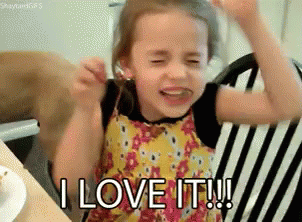
Of course, there are problems in “Living Proof” just like any other episode of Arrow. Unfortunately, Olicity is separated for most of it, but they are each struggling with the best way to protect their family. A common theme this year is Oliver and Felicity being on separate, but same trajectories. They reach a conclusion on an individual level, so they can come together and make decisions as a couple. “Living Proof” is a perfect set up for Arrow’s season finale and Olicity’s final episode.
Let’s dig in...
Oliver and Tommy
TOOOOOMMMMYYYY!!!!
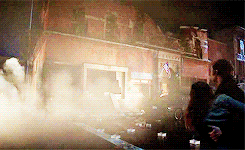
I’m always Laurel when I see Tommy Merlyn. I’m not kidding when I say I love him. It’s not just nostalgia of Arrow days long past. Tommy had a profound impact on Oliver and his journey. Oliver has lost a lot of loved ones, but Tommy’s death really changed his mind about how he should go about saving the city and what it truly means to be a vigilante. Tommy sparked Oliver’s desire to be more – to be a hero. So, it makes absolute sense Tommy appears to Oliver now to deal with his latest morality crisis.
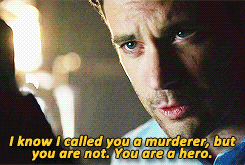
Emiko blew up a building and Oliver is trapped underneath a giant piece of concrete. He’s uncomfortably close to some rebar too and the Tommy parallels are anything, but subtle. Oliver is literally in the same life and death situation that befell is best friend six years ago. Are the writers putting Oliver in this position, so his “hallucination” of Tommy makes sense? Perhaps… or perhaps something deeper happening unbeknownst to Oliver.
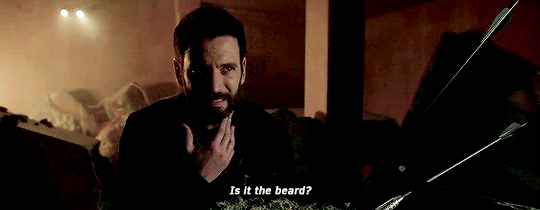
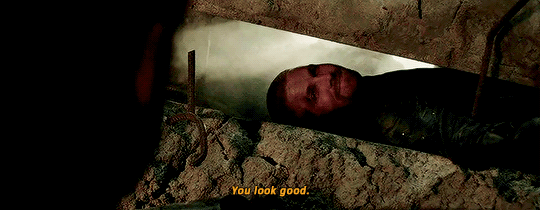
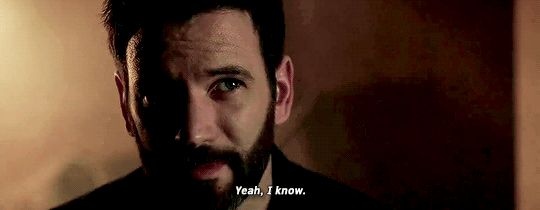
Source: smoakmonster
I firmly believe Colin was not allowed to grow a beard while on Arrow because it would overload whatever hotness Stephen Amell was bringing to the table and since he’s the lead that cannot be allowed. I know my truth.
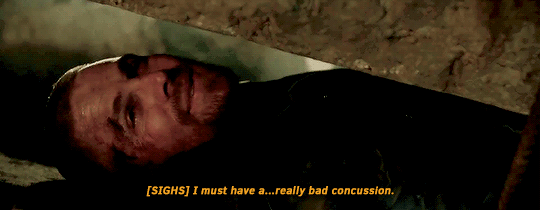
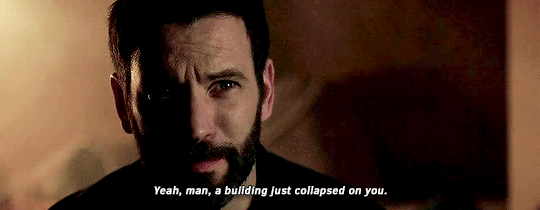
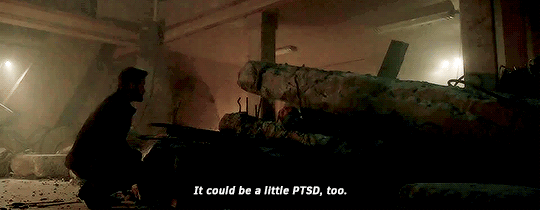
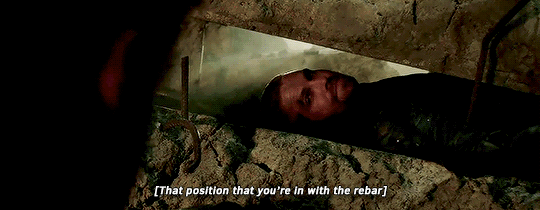
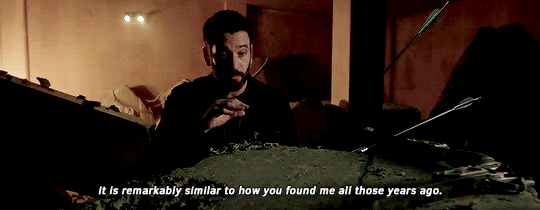
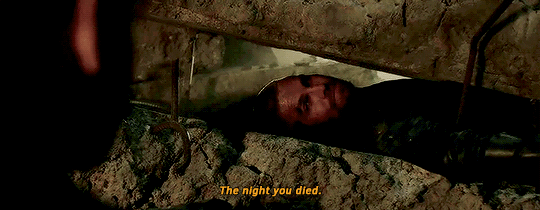
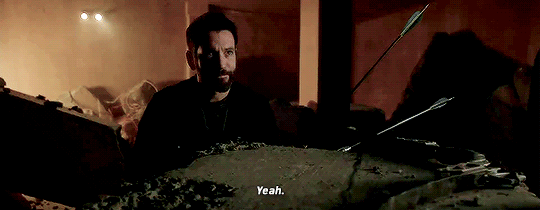
Source: smoakmonster
Tommy psychoanalyzing Oliver’s mind to explain his appearance is a hoot. Hallucination, concussion or just some good old-fashioned PTSD are all on the table, except for the one that’s the actual truth. But we aren’t there yet. We weren’t wrong to notice the similarities between Oliver’s current situation and Tommy’s death though. There’s always a reason my friends.
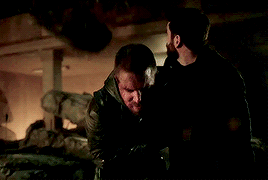
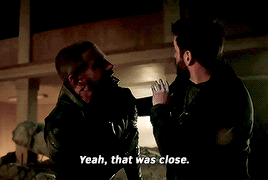
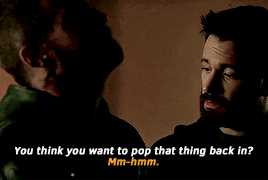
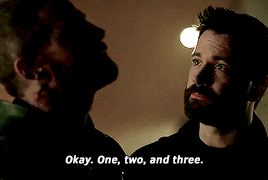
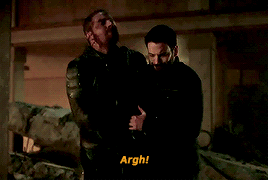
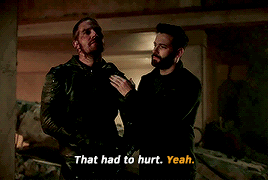
Source: smoakmonster
Oliver escapes from underneath the concrete and Tommy helps with his dislocated shoulder. We enjoy some of Tommy’s patented banter (I missed him so), but he’s here to talk about family - sisters to be specific.
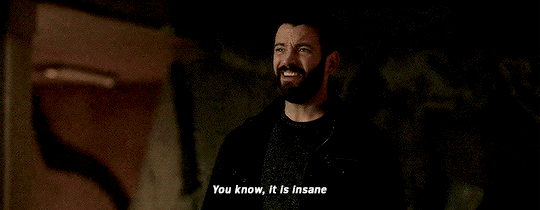
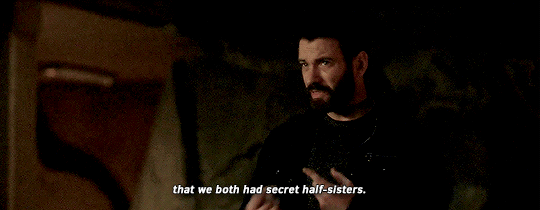
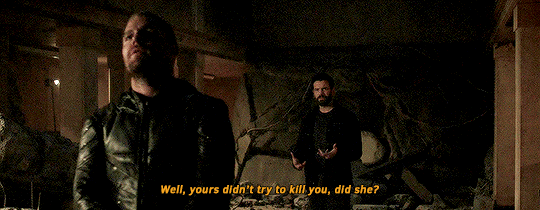
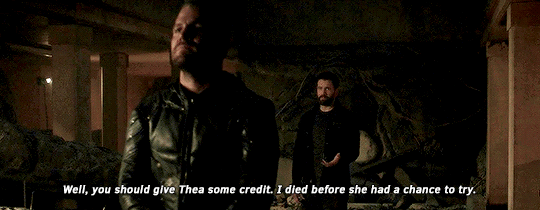
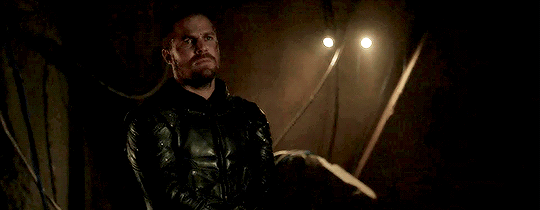
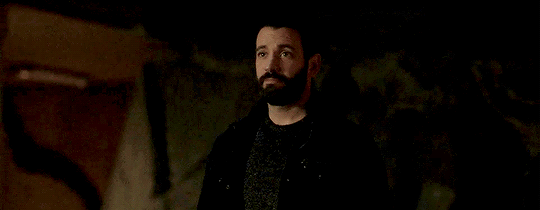
HA! I love Oliver’s “Don’t sass me look.” At least everyone is agreed this storyline would be far more entertaining if Thea went all evil. Instead, we have Emiko and Tommy wants to know how Oliver is going to deal with her.
Tommy: Speaking of, what about Emiko? What kind of solution are you planning for her?
Oliver: The one she deserves. She let our father die.
SERIOUSLY OLIVER? KILLING? ARE WE BACK TO THIS?
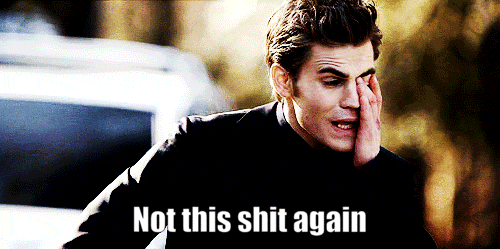
Oh, hang on I don’t have to yell at him. Tommy is taking care of it for me.
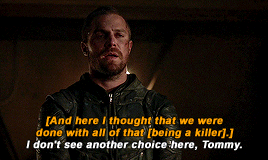
Source: ebett
See why I love him? He has a hot beard and says my words because we samesies.
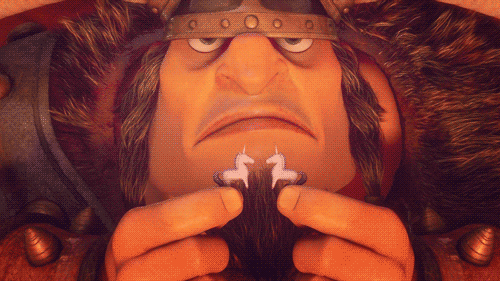
Emiko dropped another bomb on Oliver last week when she confessed to knowing about Merlyn’s plan for the Gambit and letting their father die. Oliver is pretty ticked about it, which is understandable. His sister has lied and manipulated her way into his life while wearing his superhero suit no less (RUDE), she was an accessory to their father’s murder or suicide (whichever way you want to look at it), sent Oliver to hell for five years and, to top it all off, is a terrorist. She also dropped a building on him and the team.
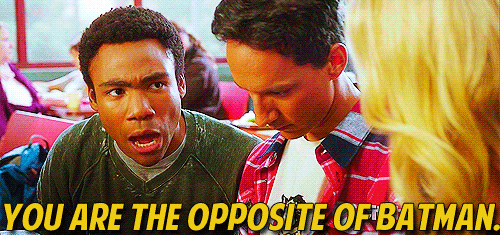
Yeah, I’d say the angry face is warranted.
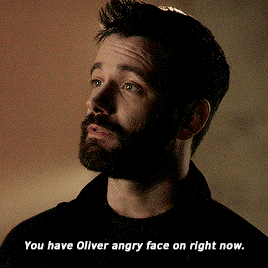
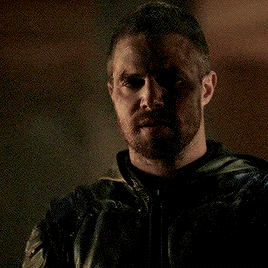
Source: smoakmonster
Emiko is the worst. Not just her actions, but she’s kind of a snoozer personality wise. None of that means Oliver should kill her though. He must move beyond that kind of thinking.
As horrible as Emiko’s actions are, she unknowingly was the catalyst for Oliver becoming someone who could stop her. It’s a mind bender when you think about it. Oliver’s life is filled with loss and immense suffering. However, that suffering has led to immense love and joy. Oliver has created a family beyond the one he was born into. His life has traveled on a path no one could predict.
I’m not saying it’s okay that Emiko and Merlyn killed Robert or that Slade killed Moira. But we’ve glimpsed the “What if?” with Oliver already. He would be happy, but not a hero. If Oliver wants to serve true justice, then he must look at the bad and the good.
Barry: We both got a look at what life would look like normal.
Oliver: It would have been happy.
Barry: But not full.
Oliver: No. Nowhere close.
Barry: To things not being normal.
Oliver: To life being full.
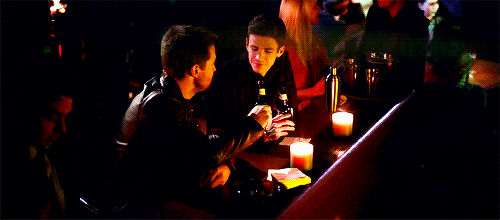
Tommy tries to defend Emiko and I’m pumping the breaks right there. Listen my delicious bearded cupcake; there are plenty of fathers who abandon their children. It’s an epidemic from my point of view; however, they don’t all become terrorists. The “blame Dad” routine is tired. It is possible to hold Emiko responsible for her actions short of killing, but we don’t need to excuse the behavior either.
If you’re tired of the kill/don’t kill debate well then, I’m sorry. It’s an integral part of the show because this is how the writers gauge Oliver’s morality and his evolution as a superhero. They will always circle back to it just like they will always circle back to Robert Queen and the “sins of the father” theme. Family, guilt, responsibility, redemption, teamwork, heroism, sacrifice, killing, love, legacy – these are all the building blocks of Arrow. The bow and arrow will always be how Oliver fights crime. Killing will always be barometer for his morality.
But didn’t Oliver already decide to stop killing after Prometheus? Didn’t he stop blaming himself for Robert Queen’s death?

He realized killing can create an unforeseen monster. Adrian Chase was the blueprint for what not to become, so Oliver forgave himself for Robert Queen’s death. He also stopped viewing the mask as a conduit for his darkness.
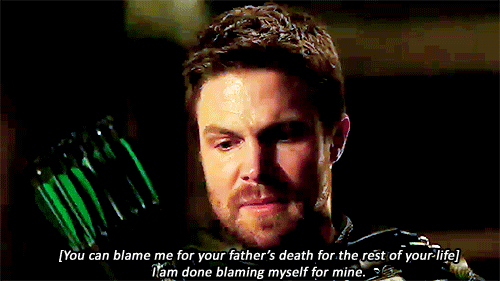
So why are we talking about killing again? Oliver didn’t kill Diaz. He didn’t kill anyone in prison. He’s supposed to be a fully realized superhero, but here he is, trapped under rubble, and discussing putting an arrow in his half sister with his almost dead best friend. COME ON.
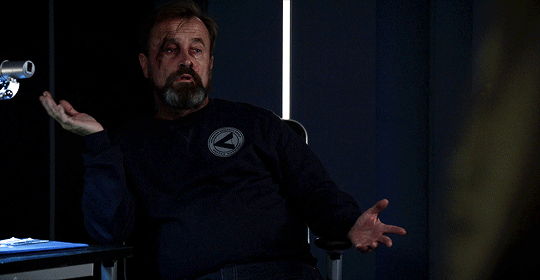
I know Oliver is not real and the writers refuse to drop this, but there is a reason for it. It’s always one step forward and two steps back with Oliver Queen. This is the biggest pine tree to ever live. Oliver continually circling back to killing feels extremely in character. He finds himself in situations where he believes killing is justified. When Oliver has exhausted all other possibilities he still believes killing can be a solution.
But what about Prometheus?
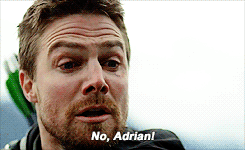
Well, Oliver couldn’t kill him because that would be giving Prometheus exactly what he wants. Prometheus believed Oliver is a killer and it would prove him right if Oliver killed him. That’s not happening here with Emiko so TA DA! Totally different circumstances! It’s completely okay to kill her.
But what about Slade?

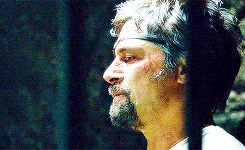
Uhhh… Oliver made a promise to Tommy no more killing and he wanted to prove to himself he could be a hero without it. Mission accomplished! NO MORE KILLING!!!
Hahaha. Just kidding. Up next we have Ra’s Al Ghul.
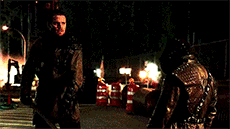
He had the League of Assassins, chucked Oliver off a mountain, tried to bio weapon Star City into oblivion and made him marry the only lesbian on the show. Ra’s had to die. Right? Right.
Damien Darhk killed Laurel and was a Terminator like magician, so Oliver was completely justified running him through with the pointy end of an arrow. On camera no less!
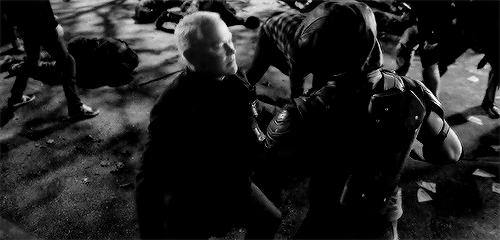
And round and round and round we go. I’m not arguing any of these people deserved to live. They didn’t. Oliver was always justified killing any bad guy and the world is a better place without these villains. However, it’s not really about the villain. It’s about Oliver Queen and his soul.
I won’t rehash all the reasons why I think Oliver should stop killing and it’s perfectly okay if you disagree with me. This is simply part of my morality. I don’t believe Oliver Queen gets to be judge, jury and executioner simply because he is the Green Arrow and has anointed himself savior of the city.
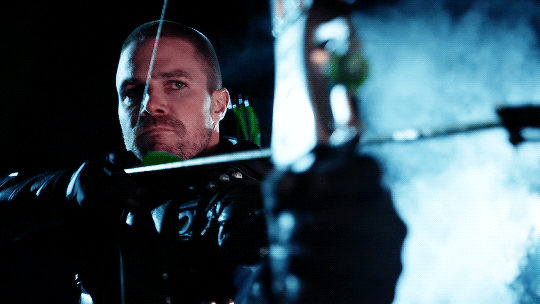
Oliver’s prison arc was in large part showing him the moral grey zones when it comes to villains. He was operating in a very black and white world when he determined which villains lived and died. Does Ben Turner deserve a death penalty for his crimes? Is he the same as Ricardo Diaz? Who gets to decide?
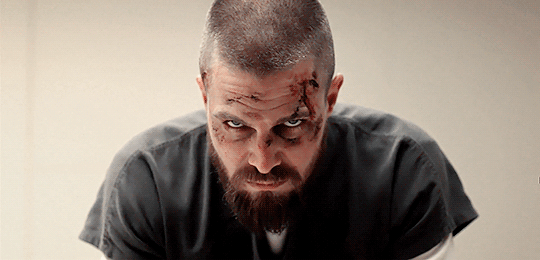
Ideally the justice system, which is why we have one. It is an imperfect system, but it’s one Oliver has tried to work within for most of the season and has succeeded at it until recently. The larger point is there is a third option for villains when choosing between life or death. JAIL.

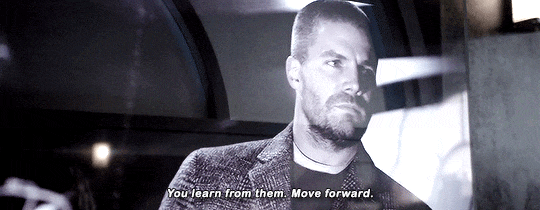
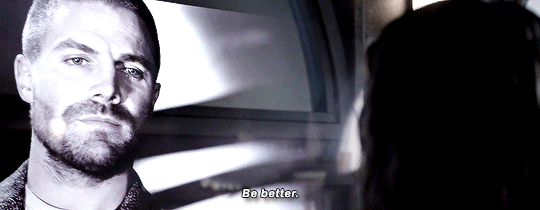
And yet, here we are again with Oliver arguing the same moral quandary we’ve argued for the last seven years. The reason we keep circling back to this issue is because Oliver Queen has no code. We can justify almost anything, which is why it’s important to have a moral code to check our justifications. We all need rules to live by, moral absolutes, which are unbreakable under any circumstances. This is the reason laws exist.
God gave Moses the Ten Commandments. Jesus gave us the Beatitudes and a whole new section of the friggin Bible to digest. If superheroes are fictional Christ like figures, then their hero’s journey needs to end with a set of rules he/she live by based off the lessons they’ve learned on the road to becoming a superhero.
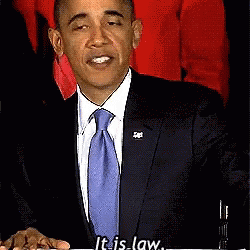
If you want a less Christian perspective, then consider superheroes modern day mythology. Every mythological hero learned painful lessons which resulted in a morality the Greek and Romans lived by. Our democracy is fashioned from the Greeks. Suffering = lessons = moral code = righteous path.
Oliver needs a code he can apply to any given situation he’s faced with because being a superhero requires checks and balances. He needs something, a lens, to filter his morality through. His morality must set a high bar too because Oliver isn’t just your run of the mill everyday hero. He’s becoming someone else… something else. Oliver Queen is superhero. He supposed to be the best of us.
Oliver views Tommy as a brain concussed hallucination, but he couldn’t be more wrong. This is Oliver’s God moment. I’ve been waiting for Oliver to have a God moment since Barry Allen had his in Season 2 of The Flash. The Speed Force aka God took Barry on an out of body experience to explain that even though Barry has incredible gifts those gifts do not make him God. Barry doesn’t get to decide who lives or who dies. He doesn’t get to rewrite the past or change the future just because he’s experienced lost. Those decisions are outside the purview of The Flash. Barry has immense power, but those powers will not illuminate loss from his life.
The Speed Force/Barry’s Mom: What you’ve become – it’s wonderful. A miracle even. But it won’t make bad things stop happening to you. Even The Flash can’t outrun the tragedies the universe is going to keep sending his way.
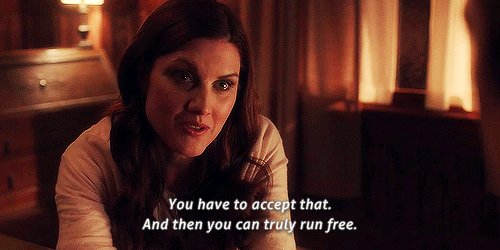
At the end of the “The Runaway Dinosaur” Barry comes to terms with his mother’s death and accepts it. He achieves peace, healing and let’s go of some of the pain which has been a weight around his neck. Until his father dies the next episode.
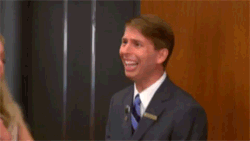
Barry chucks everything God told him out the window and creates Flashpoint to save both his parents.
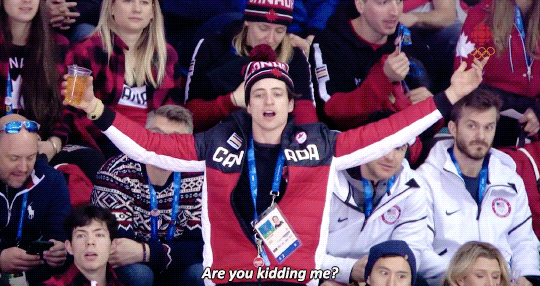
This is the point where my relationship with Barry Allen began to crumble. HE LITERALLY HAD GOD TELL HIM LOSS WAS PART OF LIFE AND HE HAD TO ACCEPT IT. BARRY HAD TO ACCEPT HE WAS NOT GOD. And what does he do? He creates an entirely new timeline where Cisco’s brother is dead, Caitlin becomes Killer Frost, Sara Diggle is erased and replaced with John Junior. Oh, and I wasn’t allowed to be mad at him about it because he’s Barry.
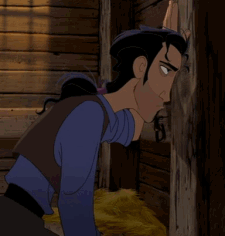
I don’t know if Oliver Queen believes in God or a life beyond death. I’m leaning towards not given his reaction to Angel Tommy, but “some things are true whether you believe them or not.” City of Angels is an EPIC movie. Watch and thank me later.
Regardless of Oliver’s personal beliefs, he doesn’t have a Speed Force. There’s no higher power/magical whatsit sitting him down for a chat to explain how life works like Barry had in Season 2. Oliver has been flying blind for seven years. Until now.
Oliver: No Tommy! Because of what he did to you.
This is the first time I’ve ever heard Oliver blame Tommy for his death. Oliver is plagued by what ifs? What if Tommy listened to him? What if he got there a little bit sooner? But none of those things happened because Tommy was blinded by the fact that Malcolm Merlyn was his father. And he paid for that loyalty with his life. Oliver isn’t going to make the same mistake with Emiko.
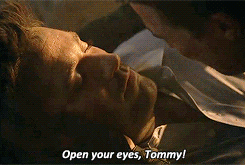
Angel Tommy agrees with Oliver! He takes responsibility for his death, but not for the reasons Oliver stated.
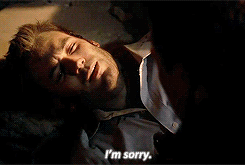
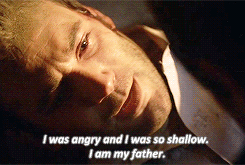
Tommy was stuck in a cycle of self hatred, one created by his father, and he couldn’t free himself from it until it was too late. Angel Tommy urges his friend to view him as a cautionary tale and break his own cycle of violence.
This isn’t the first time Arrow has referenced Oliver’s cycle of violence. We did a deep dive on it in “Level Two” during Oliver’s psychotherapy session. What that doctor was doing to prisoners was deeply wrong, but he did pull out a nugget of truth.
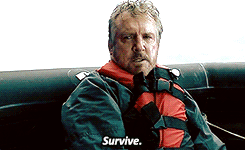
Oliver created his vigilante persona to avenge his father’s wrongs. Those wrongs began with violence and death. Oliver has often avenged those wrongs through violence and death. There is a pattern here. There is a cycle even though Oliver has done so much good as the Green Arrow.
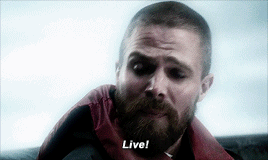
Oliver doesn’t want William to experience the same pain and loss, so he must do things differently than Robert. If Oliver doesn’t want to saddle William with righting his wrongs, then he must break this cycle and be better. Oliver must walk a higher road if there’s any hope of his children being freed from the Queen family’s past.
Oliver: No. You’re wrong. This isn’t about me. This isn’t about my father. This is about Emiko. And the choices that she made? They are on her.
Like I said it’s always one step forward with Oliver and two steps back. He is soooooo close!!!! Everything he said about Emiko is true and showcases the stunning character growth Oliver has gone through these past seven seasons. He’s not blaming himself for Emiko’s actions. Hell, he’s not even blaming Robert. Oliver is holding Emiko responsible for her choices.
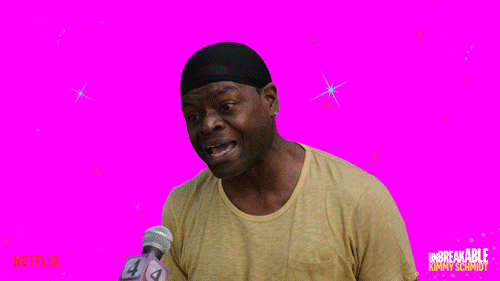
Typically, Oliver blames himself for everything. Lately, he’s been putting the blame squarely where is belongs and holding people responsible for their crimes. He has freed himself from the crippling guilt which began on that raft with Robert Queen. YES. EMIKO IS TO BLAME. NOT OLIVER.
But thennnnn he takes it one step too far. Oliver believes Emiko deserves to die.
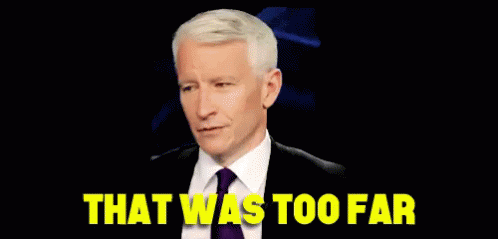
He may not be blaming himself anymore, but Oliver’s solution remains the same. He’s still stuck.
Tommy promises Oliver will eventually be free (BECAUSE HE’S AN ANGEL SENT BY GOD OKAY??!!!) but urges him to stay on the higher road because he has a shot at a clean slate. What’s wonderful about “Living Proof” is the writers give Oliver more justification to kill than any other time in the history of this show. Emiko is a threat to Oliver’s wife, son and unborn child. We won’t weep over this woman and no one will be angry if Oliver kills her because he’s protecting his family! If there was ever a justification to kill this is it. This decision is morally justified.
Oliver frees himself from the rubble, meets up with his team and comes face to face with Emiko.
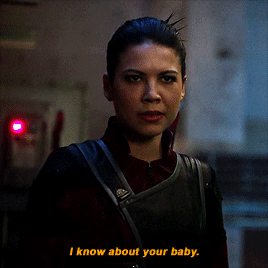
This is all it takes. DADDY RAGE ACTIVATED.
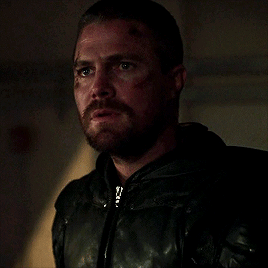
Source: olicitygifs
Emiko tells Oliver she’s made certain his family will die and even though Diggle (the moral compass) warns him not to - Oliver kills Emiko.
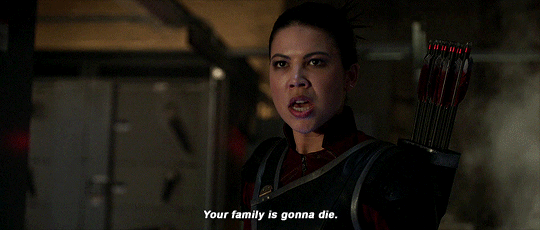
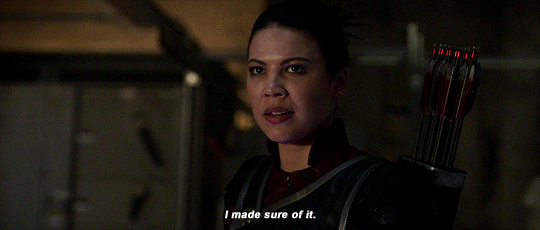
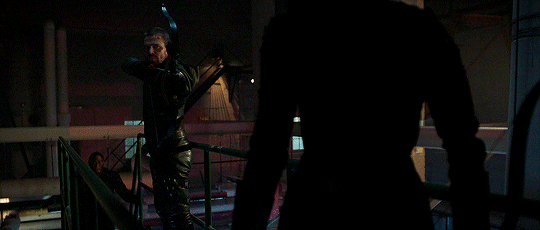
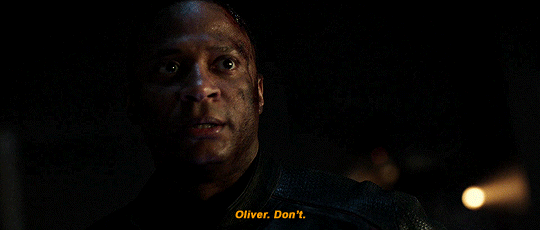
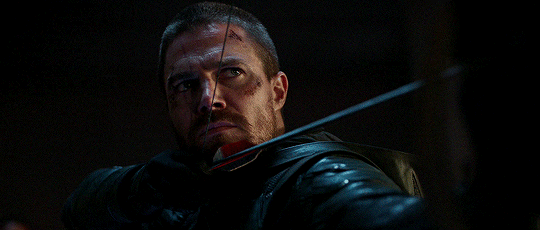
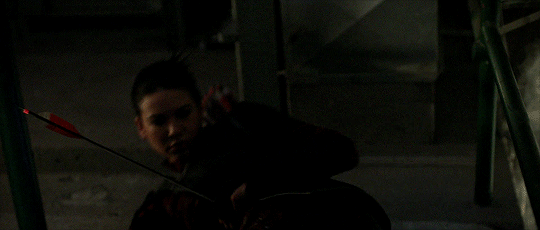
Source: olivergifs
There’s an immediate cause and effect. Emiko is dead, but so is… JOHN?

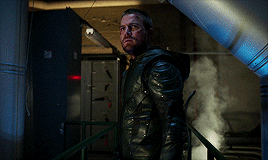
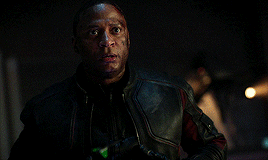
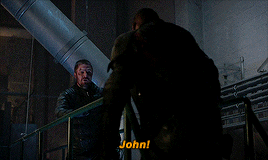

WHAT THE FRICKEN FRACK IS GOING ON? Oliver’s team is laid out Game of Thrones style.
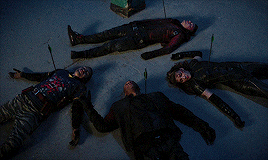

Source: arrowdaily
Is the Night King here?
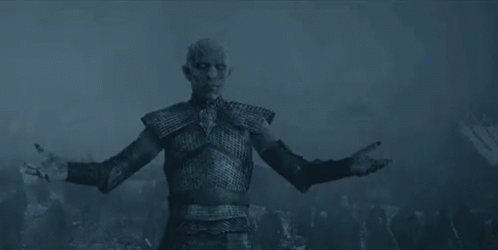
I had no idea what the hell happened.
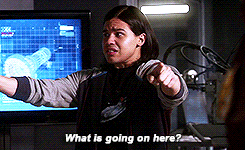
God happened. Oliver isn’t free. He’s still trapped. Angel Tommy gave him a vision of all his loved ones dying.
Oliver: What was that?
Tommy: How do I know? I’m just a figment of your imagination.
Note to self: When face to face with God don’t call Him a figment of my imagination. He gets cranky.
This is all a hallucination, right? If that’s the case, then how did Angel Tommy know about Emiko and the baby?
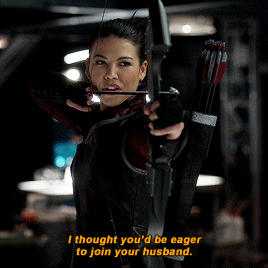
Source: olicitygifs
She just threatened Felicity. Oliver doesn’t know that happened. Sure, it’s easy to assume Oliver just played out his worst nightmare, but he’s trying to morally justify killing. Why would he show himself a scenario where killing Emiko leads to losing everyone he loves? Why would he play out this horrible scenario when Oliver thinks he’s right to kill Emiko? Why torture himself over a person he’s ready to kill?
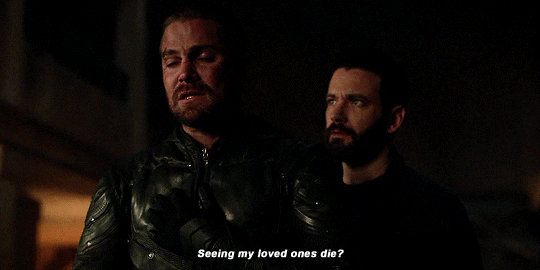
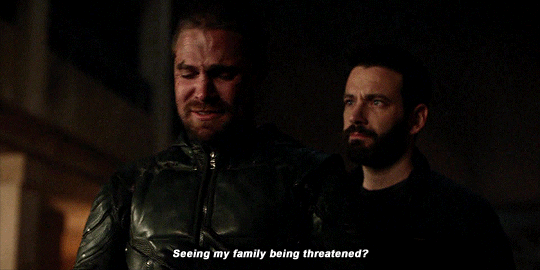
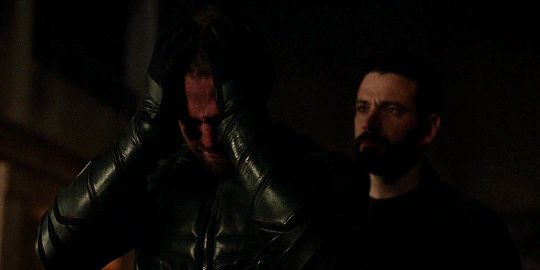
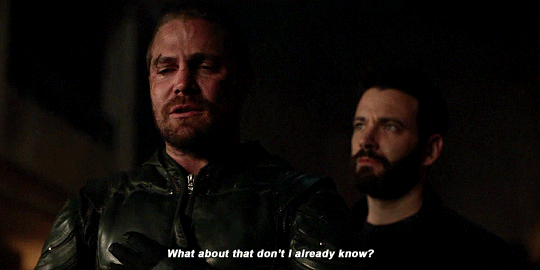
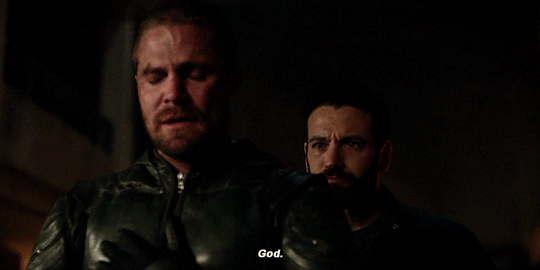
Source: olivergifs
In Oliver’s despair he calls out to God almost like an exhale. And God answers. Angel Tommy is much more than a hallucination. Losing loved ones isn’t new for Oliver, but God showed him this worst nightmare for a reason. Oliver is making decisions based on fear just like Robert Queen did. Angel Tommy briefly takes the title of Yoda from John (that’s ok he hasn’t had much use for it lately).
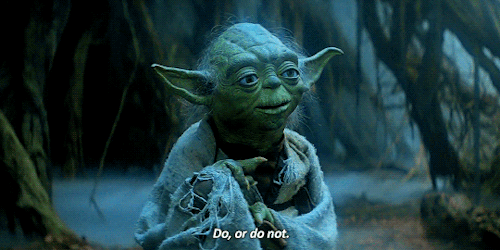
If Oliver wants a different outcome, then he’s going to have to do something different. Angel Tommy urges Oliver to embrace the best parts of him instead of giving into his worst impulses.
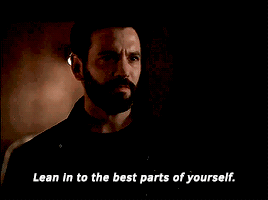
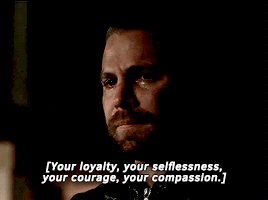
God gives Oliver Queen his code. What’s does a hero believe in? The Four Pillars of Heroism are Oliver Queen’s answer.
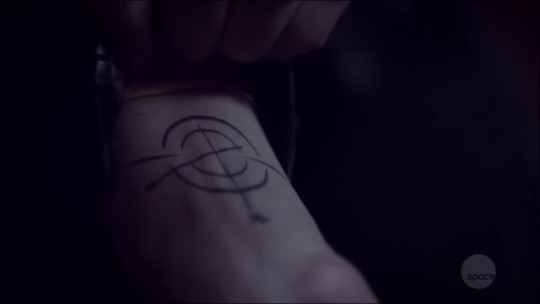
Does Emiko deserve Oliver’s loyalty, selflessness, courage and compassion? No. She doesn’t not, but that’s not really the point.
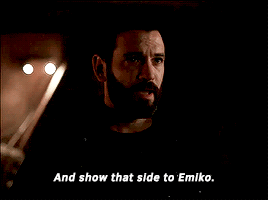
Forgiving someone when they don’t deserve it is quite possibly one of the most heroic things we can do as human beings. It’s a gift and, in many ways, it’s a gift we give ourselves too.
The beauty of these pillars is we all can embrace them. That’s what so wonderful about hero’s journeys. Heroes represent the best of humanity and are a shining beacon of the potential we could all reach. And yet, most of us don’t. Someone like Oliver Queen has a depth to his loyalty, selflessness, courage and compassion that is unparalleled. The reason why most of us don’t become heroes or saints (if you prefer a religious perspective) is because it’s too damn hard. We don’t want to make the sacrifices necessary to be one.
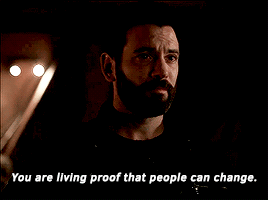
Oliver must offer the same forgiveness offered to him all those years ago through Diggle, Felicity, Tommy, Roy and Thea. Oliver is one of God’s perfect examples of the power of redemption. If there’s anything he should believe in it should be that and what God wants, more than anything, is for Oliver to be a vessel. God is asking Oliver Queen to be a servant of redemption.
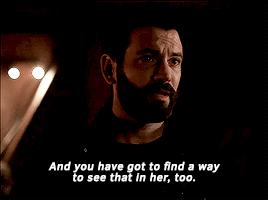
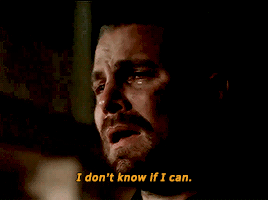
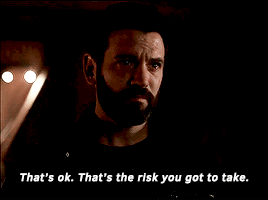
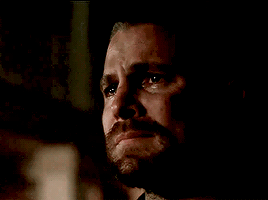
Source: smoakmonster
And it’s Tommy asking. So of course, Oliver will do it. That’s why God chose Tommy to deliver the code. Robert Queen’s death ignited Oliver’s mission, but Tommy’s death ignited his heroism. We must go back to the beginning when we reach the end.
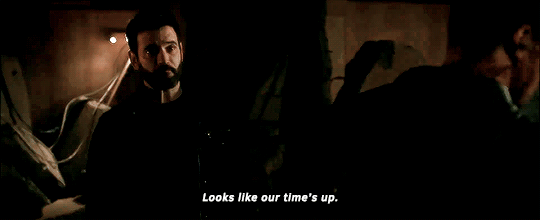
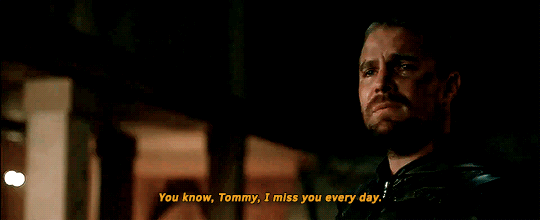
Oliver is given the chance to say goodbye again in their final moments together and Tommy makes a him promise. Death is not an end to love.
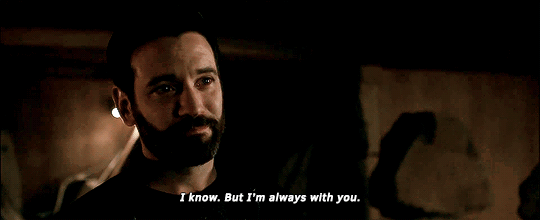
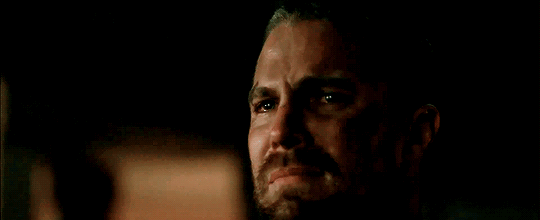
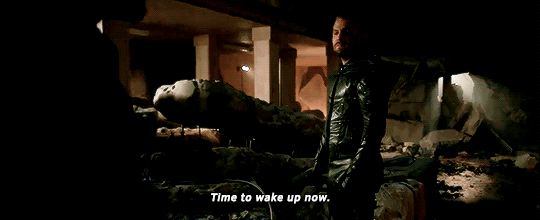
This was Oliver’s God moment. This code was the final piece of the superhero puzzle. It’s a gift born from loss, pain, love, redemption and forgiveness. Oliver is the living proof for us all. He is a beacon of light for his family, team, city and yes even villaina like Emiko.
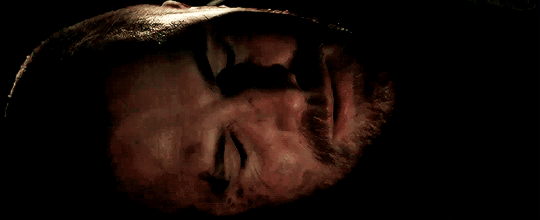
Felicity Smoak
I wish I liked Alena. It would have made her scenes with Felicity more fun, but I don’t so that’s that. Oliver is not the only one reexamining the way he’s doing things. Felicity is as well.
The SCPD tries to arrest her, which cements my belief they are the biggest twats to ever live and they will never be anything other than twats. But things take a dangerous and extremely emotional turn when Felicity and Alena come face to face with Emiko. Felicity must beg for the life of her child.
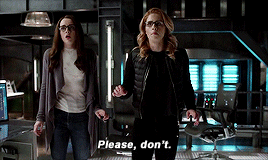
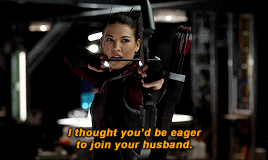
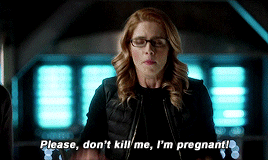
Source: arrowdaily
STOP POINTING ARROWS AT MY PRECIOUS BABES YOU CRAZY BITCH!
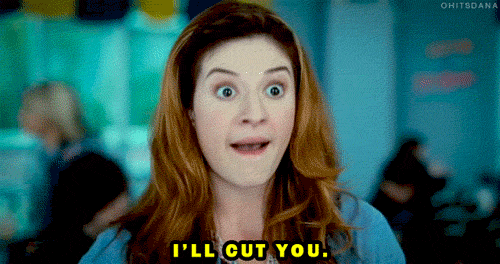
Emiko as a villain isn’t all that threatening, but Cookie Monster could be threatening Felicity right now and I’d get worked up about it.
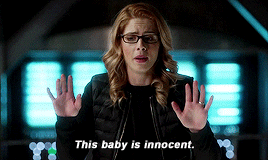
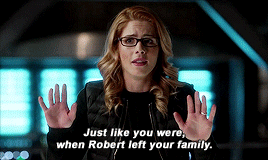
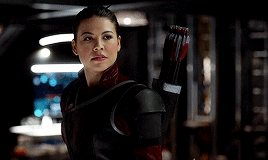
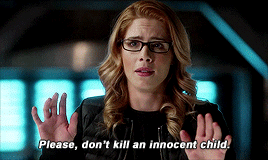
Source: arrowdaily
The speech Felicity makes is gut wrenching. Hasn’t she been through enough? Just let her pregnant in peace.
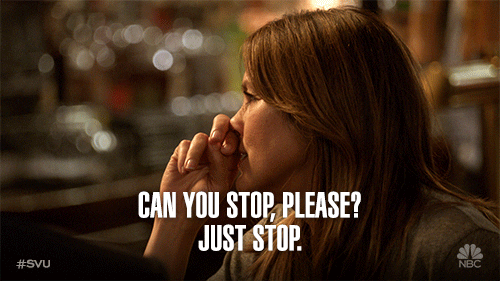
This latest life or death situation causes Felicity to ponder what kind of life her child will have. Poor William has not fared so great thus far. Being a child of heroes is not an easy thing as we see in the flash forwards.
Is Arrow saying Oliver and Felicity can’t do it all? Are the writers saying Oliver and Felicity can’t be heroes and have a family?
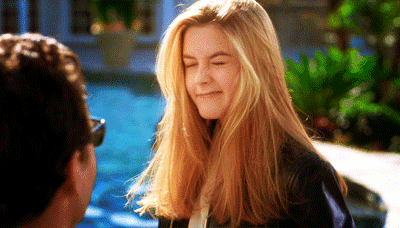
No, I don’t think so because Oliver and Felicity have been doing it all for the last two years. They got married, brought William into their home to raise
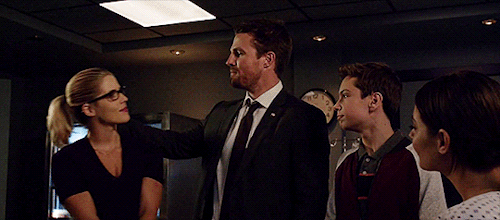
and expanded their little brood all while actively fighting for the city as vigilantes.
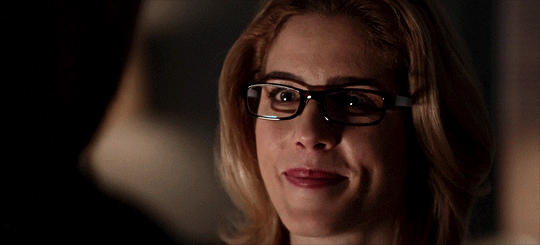
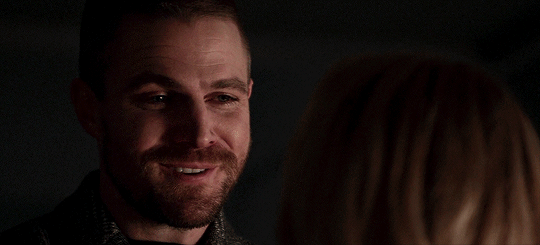
Oliver isn’t choosing between man and mask anymore. He’s embraced both personas and he’s been living in the light more than he ever has in previous seasons by working with the SCPD (twat factory that it is) and going hoodless.
Timing on Arrow is always a tricky thing. I didn’t expect to see Oliver live his happy life with Felicity for as long as we’ve been blessed to watch it. Most television shows end at wedding or baby, but not with this show. Oliver is a fully realized superhero. That evolution worked in conjunction with his relationship with Felicity and not as a “reward” for his superhero evolution. Oliver could never become a superhero without Felicity. He needs her. Felicity Smoak is Oliver’s superhero.
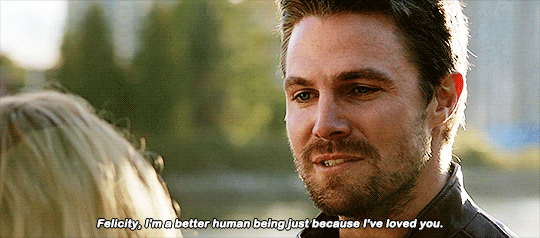
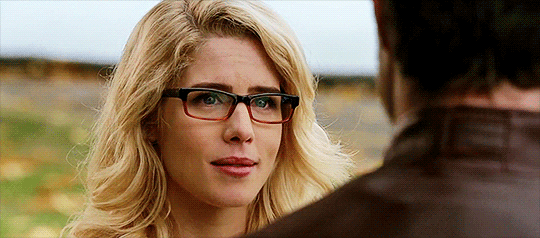
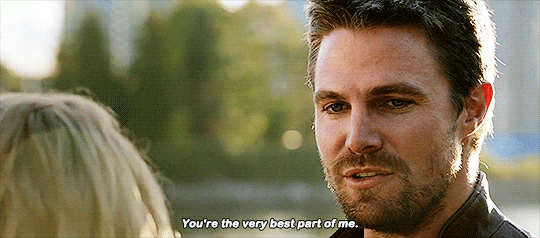
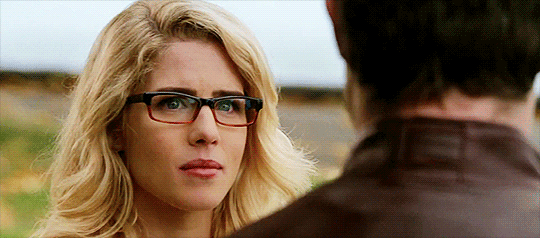
But that doesn’t mean there aren’t consequences to their choices. Sure, the show could tap out and maybe it would be all rainbows and puppies in the end, but probably not. Arrow isn’t that kind of show and there was always going to be pain right up until the final moments.
Personally, I like that the writers are examining the consequences of having a family and being heroes. We like to tell ourselves we can “do it all” but there are consequences to every decision we make. Once we go through a door another one closes behind us.
Life is not about “having it all.” It’s about deciding the kind of life you want to live and accepting the ramifications of those decisions. There is no perfect plan. There are always negatives to every choice. We must determine not only if our choice makes us happy, but if we can live with the negatives.
What makes Oliver and Felicity happiest is fighting for their city, but they realize that puts their family in danger much more than if they’d chosen to be farmers or dermatologists.
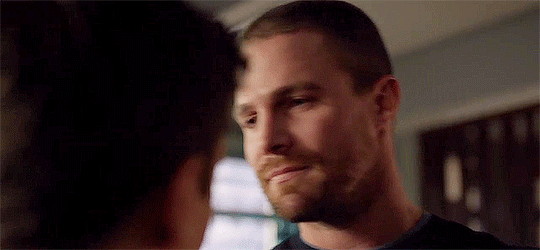
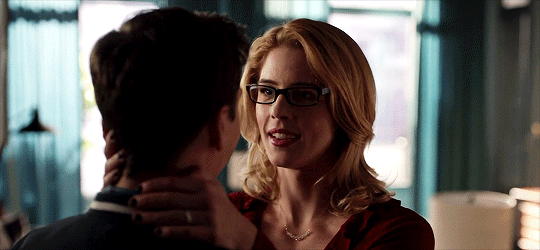
It’s a very real consequence that cost them William. He bailed. So, what about the nugget cooking in Ms. Smoak? Oliver and Felicity can proclaim their number one priority is keeping their children safe, but they are also actively engaging in behavior that puts their children at risk.
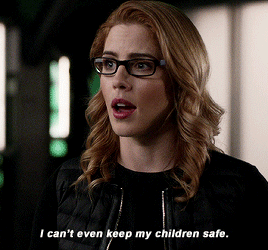
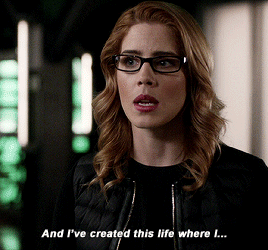
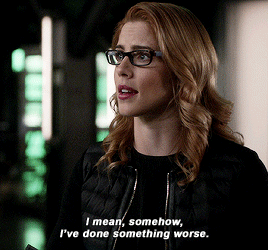
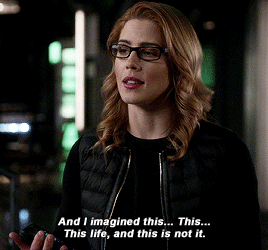
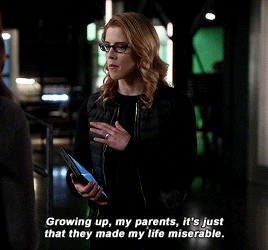
Felicity tells Alena about how she wants to be a better parent than her parents. I love Donna Smoak, so it made me a little sad to hear Felicity say this. I think Donna was a spectacular mom to Felicity, but I also understand they are opposites which probably drove Felicity crazy as she grew up. And of course, there’s always Noah Kuttler to set the parenting bar real low. Let us not reflect too heavily on Robert and Moira Queen either. Sure, they made the ultimate sacrifice to keep their children safe, but they were pretty much disaster zones of parents right up until their final moments on this earth.
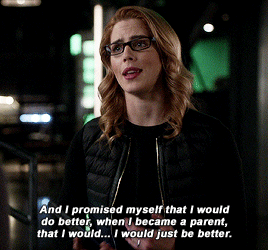
Felicity always wanted to be a mother. There has been some debate on this topic over the years and “Living Proof” essentially ended it. Yes, she wanted children when she imagined what her life would be someday. Maybe she didn’t know how or with whom that dream would come to fruition, but motherhood is something Felicity wanted. This is great because… spoiler alert she’s pregnant!
It’s perfectly acceptable if Felicity didn’t want children, but I’m glad Arrow didn’t go down the “I changed my mind” trope we so often see on television. Like there’s something inherently wrong with not wanting children and thus the character’s mind must be changed. Nope. There isn’t anything wrong with it. It’s a perfectly valid lifestyle choice.
Of course, there are some who change their minds and that’s valid as well, but storytelling can fall into some uncomfortable tropes and the “change the woman’s mind about becoming a mother” is one I’ve watched too much. I’m also fed up with the “kill the lover/husband but the woman gets to have his baby” trope too in case you’re wondering.
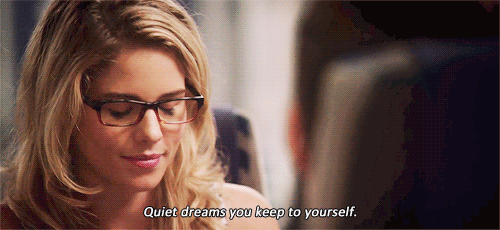
Being a mother, however, was not something forced upon Felicity because Oliver wanted it or something she warmed to because of her relationship with William. It was a quiet dream she kept to herself. A dream William and Mia fulfilled.
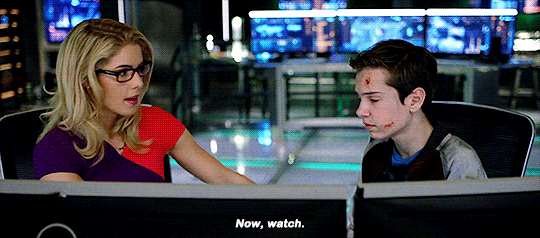
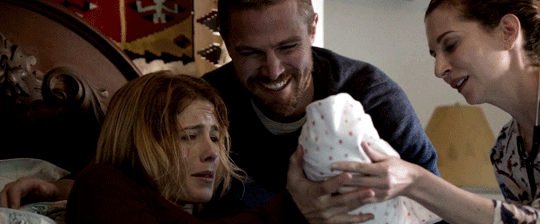
Of course, Felicity is an amazing mother. The sky is also blue. This conversation with Alena is just one of the million ways the writers showcase Felicity’s A+ level mom skills. Yes, being a vigilante makes Felicity whole. It’s her calling,

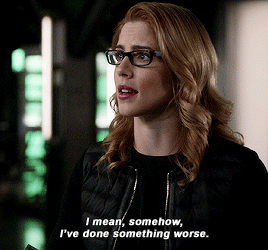
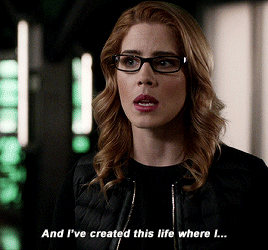
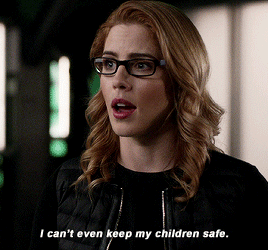
Source: ebett
BUT kidnappings and attacks by serial killers is a serious downside to this career choice. That’s just facts.
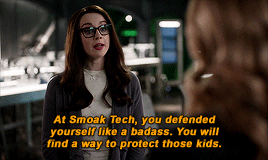
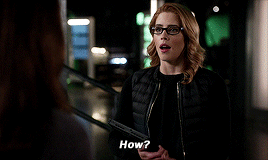
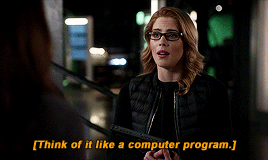
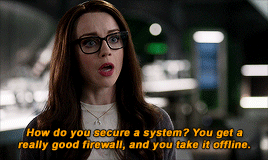
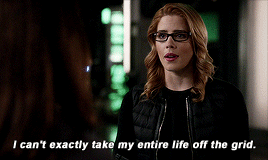
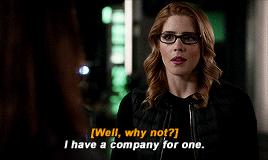
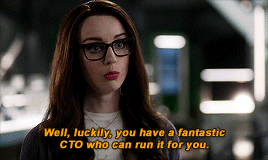
Source: ebett
They say the definition of insanity is to do the same thing over and over again and expecting different results. If Felicity truly wants to keep her children safe, then perhaps she and Oliver need to change their nightly activities. At least for a little while. Our happiness doesn’t have to come all at once. The life we build can be put together in pieces, bit by bit, until we’ve found a way to incorporate all the things that make us happy while balancing the consequences (good and bad) of those decisions.
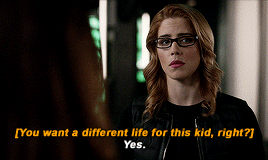
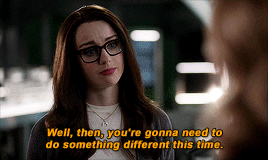
Oliver and Felicity love Star City, but they love their children more. Are they willing to walk away from everything they’ve built to keep their children safe? Is that even a question? Of course. They are parents.
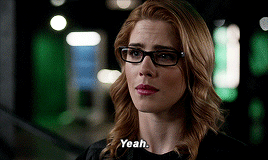
Source: ebett
William Clayton
The messiest part of this whole flash forward storyline is William.
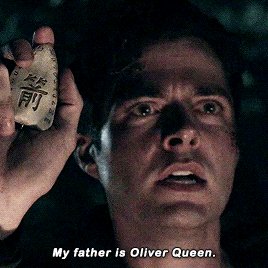
The writers wanted to keep Mia’s identity a secret which is difficult if everyone knows who she is. This gets dicey when it comes to her brother. Personally, I don’t think William and Mia being kept apart for 20 years was necessary. Sure, it was a great “OMG I KNEW IT” moment and it will be interesting to watch the two of them develop a relationship IF we get a spin off.
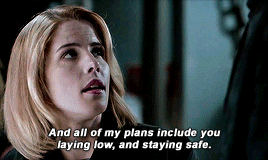
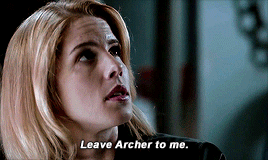
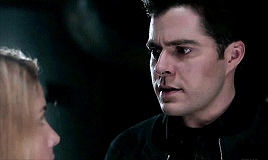
Source: arrowdaily
However, it doesn’t change the fact that this storyline is a dumpster fire. William continues to bitch about Oliver and Felicity abandoning him in the flash forwards. YOU WANTED TO LIVE WITH YOUR GRANDPARENTS WILLIAM. OLIVER AND FELICITY BEGGED YOU TO STAY BUT YOU LEFT FOR A NORMAL LIFE. Can we at least remember history correctly? Own your choices kid.
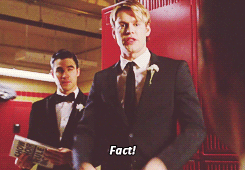
But we haven’t circled back to Oliver and the voicemails. Oliver just decides it’s perfectly normal his son isn’t returning ANY of his calls? He never goes to see William in Central City? REALLY?
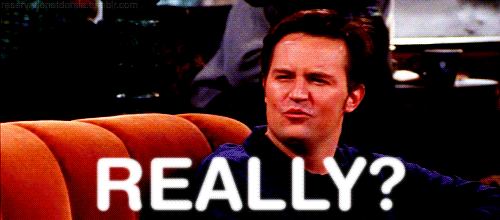
And then of course there’s Felicity in the cabin for 20 years. I understand why she didn’t live in Star City and remained hidden. Maybe she thought William had a better set up living with the grandparents. He also apparently changed his name... sooo I guess he’s safer with them or something?
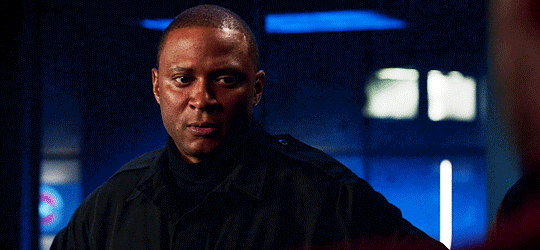
Bottom line - Felicity is his mother. It’s difficult to process a situation where Felicity would not bring William home to her at some point.
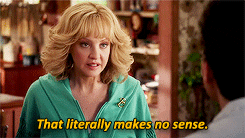
This is where I understand William’s anger. Yes, Felicity believed she was keeping William safe, but the logic doesn’t really track. If Mia is safe living with Felicity, then so is William. Keeping Felicity and Mia separated from William for 20 years just so the Olicity baby reveal is more shocking to the casual viewer and attempts to keep us fandom super sleuths on our toes for five minutes longer isn’t worth the collateral damage.
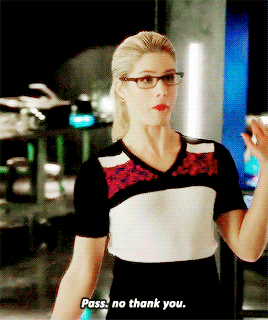
Dinah and Roy
Sweet mother of Moses where the hell do I even start? Dinah finds out the SCPD knows Roy murdered those two guards and she immediately starts bitching about her job.
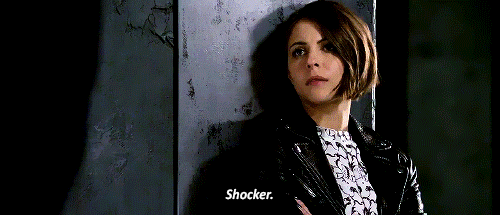
Dinah: She lied about us being behind the Ninth Circle attacks, but she was telling the truth about us covering up those murders. We never should have done that.
Of course, Roy feels terrible his uncontrollable Lazarus Pit rage which resulted in the death of two innocent people and he will live with the guilt the rest of his life. But he ALSO cost Dinah her job and that is most important.
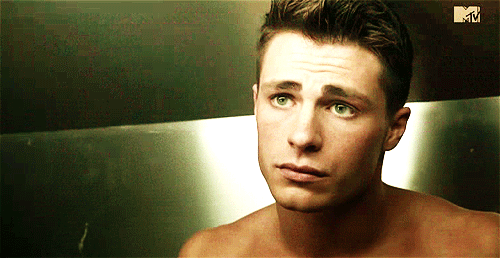
Dinah: He’s right. I’m sorry but the SCPD has already tried to arrest Felicity. Its better one of us takes the fall than the rest of us spending our lives as fugitives.
It’s not surprising Dinah and Rene are willing to feed Roy to the sharks to save their own asses.
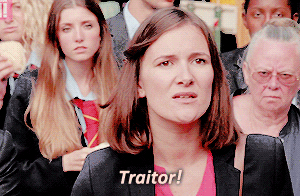
We have alllll of Season 6 as evidence that this is exactly the kind of people they are, but unfortunately this DRIVES ROY TO SUICIDE. He volunteers to shut off some poisonous gas and the chances of his survival are next to zero.
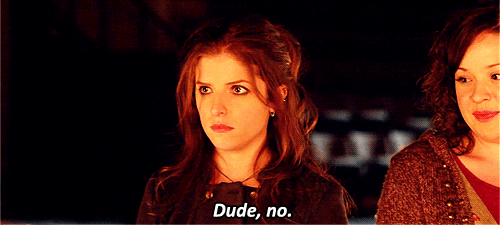
And what do we get? Dinah crying. PICK A LANE BITCH. You don’t get to guilt Roy into sacrificing himself and then cry over his corpse. You had zero problems sending him up the river for a nice long stint at Slabside if it secured your 401K. But now she’s oh so sad because her new bestie is flinging himself into toxic waste fumes? I CANNOT WITH THIS WOMAN.
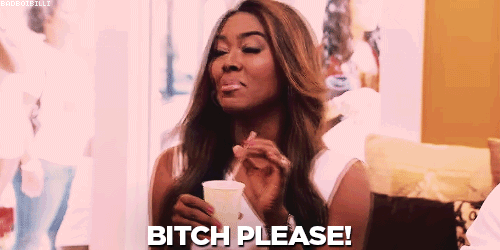
Roy survives because he’s the Parkour Prince and Dinah offers some mea culpa about how the world is a better place with a hero like Roy in it. NO SHIT! WE’VE BEEN THERE FOR THE LAST SEVEN YEARS DINAH. Hey everybody! Roy gets to stick around because Dinah said it was okay!

I have whiplash.
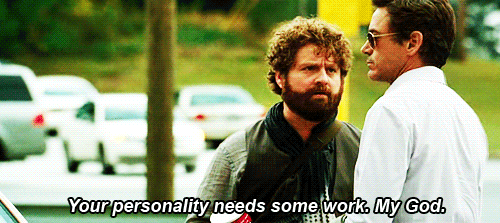
Dinah: I was wrong. We all make mistakes.
Yeah, but you continually make the same mistake Dinah. It’s called disloyalty. What the team should have done is doctor the video, so it looked like Dinah killed the guards and handed it to Bingsley with a big red bow.
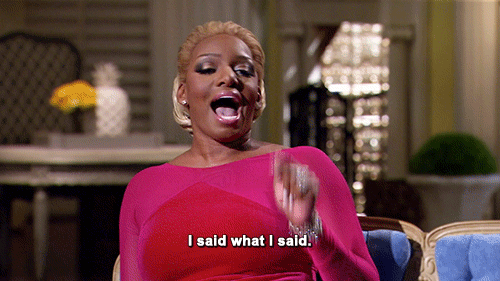
Stray Thoughts
Oliver had a building on top of him. Roy had cardboard. It's not always fun being the lead.
I really needed the show to be Tommy backseat hero-ing Oliver for the last six years.
Doesn’t Angel Tommy sound a lot like Felicity? It’s an absolute tragedy Tommy and Felicity never had any scenes together. I will forever blame L&urel for the joy she stole from me.
"I don't know how you ever breathe on this job."
"I don't." I love Felicity Smoak.
It makes me sad seeing Felicity’s genius corrupted like this.
ALENA WAS THE MAD SCIENTIST THUS CONFIRMING MY SUSPICIONS THAT SHE IS THE WORST.
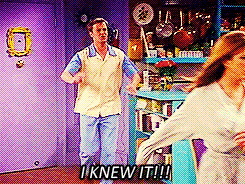
Mia defending Felicity is a big mood.
I love you Roy. You are Olicity's first born son, but this is a lot your fault. So, I accept the guilty face. Next time tell Oliver you have homicidal blood lust tenancies before going out into the field. Okay cookie? Uh huh. Thanks.
Don't think about how we missed out on Tommy Merlyn for the last six years and put up with L*urel L*nce nonsense season after season instead. It'll never be okay.
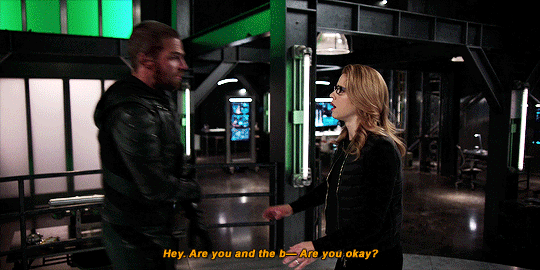
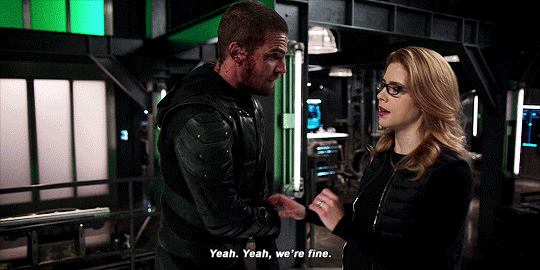
It was weird Olicity didn’t hugh when they reunited. Made the scene awkward. I loved how Oliver almost slipped up and said “baby” though. Source: olicitygifs
Completely unacceptable we only had one Olicity scene for Emily’s second to last episode.
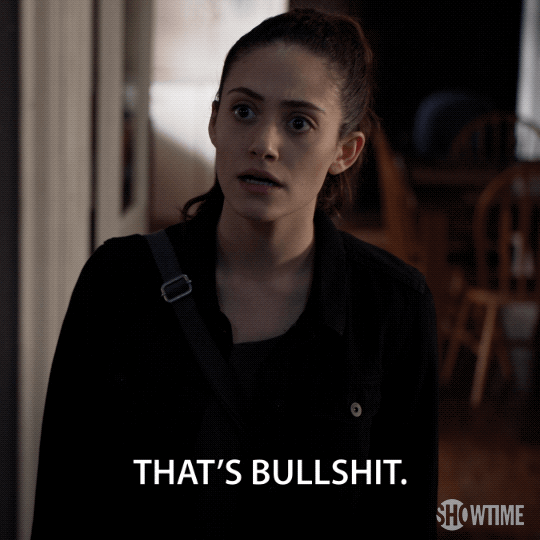
Disclaimer: Any gifs on the blog are not mine. If you would like a gif removed from my reviews, please message me. 7x21 gifs credited.
If you’d like to support the blog, please buy me a cup of tea!
#arrow#arrow spoilers#arrow 7x21#arrow reviews#oliver queen#tommy merlyn#felicity smoak#anti dinah drake#roy harper#william clayton#arrow season 7#arrow season 7 reviews#season 7 episode review#season 7 episode reviews
58 notes
·
View notes
Text
Rupi Kaur Taught Me DIY
(TW for mentions of sexual assault.)
Last year, I wrote a short essay on why I hate Rupi Kaur. Not just why I hate her work, but why I hate her as a writer. Maybe even as a person. I had never (and still haven’t) met this woman, which should have been my first clue that there was something underlying these emotions that probably wasn’t fair to her. But I was comfortable in my hate, even more so when I could articulate everything that was wrong with her in a way that was logical and academic and had nothing to do with me—so much so that I was unable to see that my disdain for this woman did, in fact, have almost everything to do with me.
Growing up as a young girl whose first love was books, I found myself torn between worlds. On my top shelf, I kept some of my favorite series—Percy Jackson, Pendragon, Artemis Fowl. These were books my parents approved of, holding imaginative, fantastical worlds and morals of bravery and friendship. Under my bed were my other favorites—the ones my parents didn’t approve of—The Clique and The Princess Diaries. These kinds of stories were adventurous in a way that was relatable to me, with the struggles of teenage friendship and the perils of mean girls, but they did skip over many of the lessons I got from my more “gender-neutral” books, and they did not have fantastical or imaginative worlds unless they came with a borderline-abusive romance.
Early on, I learned another kind of lesson: as a woman, I will constantly have to choose between books that tell stories that are inspiring and creative, and books that tell stories about people like me.
When I first heard about a young, South Asian, feminist, second-generation immigrant woman who wrote openly about her identity and her story, it was if my childhood prayers had been answered. It seemed too good to be true—I am also a young, South Asian, feminist, second-generation immigrant woman. If I was ever going to find a poet I could relate to, Rupi Kaur was it. Finally, there was poetry being written by people like me for people like me, and I didn’t have to choose between quality and relatability anymore. Imagine, then, how it felt to open up one of her most famous books and read this: “how is it so easy for you/ to be kind to people he asked / milk and honey dripped from my lips as i answered / cause people have not /been kind to me.”
I was dumbfounded. Surely I had picked up the wrong book. This was a book of 2014’s 25 saddest tweets, and the #1 New York Times bestseller Milk and Honey was somewhere else. Where was the symbolism? The wordplay? The rhyme or meter? Even the line breaks had no apparent significance. And above those basic elements of poetry—where was the deeper meaning? It’s a sad conversation, but one that, rather than sitting in a book of supposed poetry, would fit better on a teenager’s Tumblr post, or somewhere else you could read it very quickly, frown a little, and move on. And I did just that.
I returned the book to the stack of fifty just like it, and from Rupi Kaur's Milk and Honey I re-learned that same lesson I learned as a child: good books do not tell your story. Move on.
I won’t pretend that my knowledge of poetry comes from more a few college classes, but if there’s one thing I learned, it’s that understanding a poem takes time. Poems hold secrets—alternate meanings and obscure allusions—that you can only discover when you read them again and again. Their meanings can be argued and refuted using symbols and allusions to books written one-hundred years earlier and a comma placed here instead of there. Sure, over-embellished poetry sometimes does hide more than it reveals, especially to the young or less educated reader, but Rupi Kaur’s work strips an idea of all layers beneath its surface.
Some call Kaur’s style accessible, but I call bullshit. Accessibility is about delivering complex concepts while breaking the barriers that typically surround them, whether those barriers be based on education, class, gender, sexuality, or race. Tossing a sad thought you had in the shower to a young audience does not break barriers to feminist or survivor literature of any kind.
On a personal level, I do hold some empathy for Kaur. Her poems attempt to address difficult topics like heartbreak and abuse, and I imagine she has been through some trauma that many women are familiar with, myself included. The meaning of the poem I read in the bookstore was not lost on me: sometimes people are kind because they are already acquainted with cruelty. But simply stating something true or shocking does not make it well-crafted, and it certainly does not make it poetry. Much of Kaur’s success comes from stating the obvious in the most plain way possible, taking a complicated idea and hollowing it out into a pretty painted shell.
To put it simply, Kaur’s work is shallow. It seems to lack effort as much as it does depth, and despite her education, it displays little mastery of imagery or symbolism or poetic style. It is less poetry than it is bite-size food-for-thought possibly conceived in a trendy hipster cafe and posted on Instagram as the caption for an aesthetically pleasing but disappointingly grimace-inducing over-sweet cup of milk and honey. Kaur touches the surface of ideas before shying away like a cat from water, and in doing so fails to teach her audience of young women and girls—many of whom might have fallen in love with poetry had they not been alienated by mainstream misogynistic and white-centric classics—how to analyze and write complex ideas that are pivotal to their recovery, their self-esteem, and their survival.
If my school had taught more female-friendly literature when I was in high school, I wouldn’t have begun to hate reading. The books we read that actually included women were traumatic at worst and voyeuristic at best, and my teachers seemed oblivious, perhaps simply starstruck by the stubbornly unwavering fame and brilliance of the classics. Nevermind that 1984 featured a protagonist with a burning desire to rape the book’s only notable female character. Nevermind that the sexual liberalism in Brave New World had my elderly, white, male substitute teaching us that the World State was—despite its female citizens’ complete lack of reproductive autonomy and a suspicious absence of female Alphas—a feminist society. Nevermind that The Handmaid’s Tale, despite actually being a feminist novel, depicts a misogynistic hellscape a little too realistic for comfort.
The older I grew, the more it seemed that very few of the classics were written with women in mind, and almost none of them seemed to be written for women’s benefit, education, or—god forbid—enjoyment.
Disappointed by the classics, I returned to popular fiction as a teenager, desperate for a story with a protagonist I could relate to, or at the very least did not want to strangle every time they opened their mouth. At my local flea market, which I frequented every first Saturday of the month, I had come across a well-stocked used-book stall. While making my way through The Princess Diaries series dollar by dollar, I stumbled upon a book that I can only imagine was placed in flea market stall that day by the Devil himself just so he could have a laugh: The Girl With the Dragon Tattoo. I won’t give away any spoilers, but I’ll give you one guess what happens halfway through. I am not ashamed to say I stopped reading anything other than The Princess Diaries for some time.
I wish I could say my high school experience was unique. There is a profound need for contemporary literature and poetry that not only does not alienate women, but caters to us specifically. We deserve to read books that do not hurt us more than we already are hurting, that address our trauma but don’t weaponize it against us. We deserve to witness other women powerfully and passionately explore and understand our shared experiences and shared pain. We deserve to learn how to explore these ideas for ourselves. The feminist subjects of Rupi Kaur’s poetry deserve nuance, because the more precisely we are able to articulate our experiences and ideas and traumas, the more understood they—and we—become. Much like I was as a young child, the girls devouring Rupi Kaur’s work are still scrambling for crumbs. She had the opportunity to feed a generation of girls starved for poetry free of white men’s hunger, and she didn’t.
Kaur, at first, seemed to me to be nothing new in a world of successful yet seemingly talentless women who continuously fail and profit off of the next generation of starving girls (the Kardashian-Jenner clan comes to mind). But only on my own journey to becoming a writer did I come to understand that Rupi Kaur might be different, that she might actually be trying very hard--that she might be hiding something. As a reader, I never understood that a fact that I am painfully aware of now: writing makes you vulnerable. The more I wrote, the more I began to realize that what I perceived as lack of depth was, perhaps, a terribly relatable inability to be open.
It’s what I hate the most about writing—displaying yourself to the world when your childhood scrapes are still scabbing over and everyone is certain to see under your skin. I’ve never been good at being vulnerable, which makes me a reluctant writer on a good day and a liar on the rest. People do weird things when they’re afraid, like write mediocre poetry or channel all their anger at the world towards someone they’ve never met. I could not do, or at least have not yet done, what I ask of Rupi Kaur. What would I tell her, I imagine, if I ever met her? I could deflect: “Hey Rupi, your poetry about your suffering needs some work.” Or I could be honest: “Please, Rupi, tell my story for me.”
Because isn’t that what I always wanted: a story just like mine, read to me like a mother would read to her child at bedtime, a story about people like me that teaches me I’m not alone. I had waited for representation so long that when it finally arrived, it felt like a betrayal when it fell so far short. I don’t hate Rupi Kaur because her work is bad—I hate her because her work is bad and there are almost no other options. I hate her because she is my generation’s standard for how to write stories like hers and mine, and it does not do them justice. I hate her because I wanted her to do what I didn’t yet have the courage to do myself.
Maybe I’m projecting; maybe Rupi Kaur is exactly as shallow as her poetry suggests and no amount of openness will make it better. It doesn’t change that I expected someone else to be the writer of my story simply because we have a lot in common. I wasn’t fair to Rupi Kaur when I wrote my 300-word-long-rant about theintolerable injusticeshe was inflicting on young women and girls—which I posted, and I’m aware of the irony, on Tumblr and Instagram. I placed the burden of my vulnerability on her shoulders.
I stand by my criticisms of Rupi Kaur, but I also owe her some gratitude, because she taught me another lesson: I can’t rely on other people to tell my story, or stories about people like me. I can’t rely on other people to fill a void in literature or poetry or to fix any other problem I insist needs solving.
If you want something done right, or even done at all, sometimes you just have to do it yourself, even if—especially if—that means opening up about experiences you’d rather keep hidden. If Rupi Kaur is any indication, the bar for young women’s contemporary poetry and literature is evidently on the floor, which, on the bright side, means that any woman who has the courage to openly, honestly, and vulnerably tell her own story—even if she gets ripped to shreds by mean girls like me—will still be doing all of us a favor.
#disclaimer i wrote half of a draft on the train to school and then the final draft the night before it was due#so its not exactly mm.. polished#mine#words#mine words...
16 notes
·
View notes
Link
A gaggle of representatives from theologically liberal denominations recently issued a statement against Christian nationalism in America, claiming that it threatens both American democracy and the ability of our religious communities to live in peace.
To be sure, Christian nationalism is an extremely odd place to find the threat to religious freedom in a world that increasingly makes demands like “shut up and wax that woman’s b-lls.” But the irony goes deeper than that. It’s not some stroke of blind chance that lead to religious freedom in the Christian West—it was, in fact, due to our Christian faith.
To be sure, although I know self-described Christian nationalists, I’m aware of no organized political movement for this statement to oppose and so, no standard definition. Nevertheless, I have never found the label to apply to some of what the statement opposes—calls for theocracy, a conflation of American and Christian identities, and certainly not a “cover for white supremacy,” which the statement tosses in to poison the well. I’ve no interest in contending on behalf of such things.
Nevertheless, until “Christian nationalism” coalesces into something more definitive, in my experience the phrase best describes something much simpler: a rejection of the religious neutrality of the late 20th century in favor of 1) a recognition that Christianity has had a unique and privileged influence on our American heritage that overshadows the influences of other faith traditions, 2) a conviction that a Christian understanding of the world should predominate over other worldviews in American civic life, and 3) an understanding that a nation that successfully excised or sufficiently diluted this influence could no longer be called “American” in the same sense as before. Although more general than what the statement condemns, this understanding would actually encompass many Americans, whether they accept the label or not.
…
The First Amendment forbids the establishment of a state church in the United States, but it in no way imposes the incoherent burden of religious neutrality on our civic institutions, nor demands that the right to free exercise of religion end when one crosses from private life into the public sphere. We are already experiencing the erosion of religious liberties that these erroneous presumptions have caused, with Christian business owners and officials forced to promulgate ideas they abhor and facilitate celebrations that are incompatible with the teachings of Jesus Christ.
Today, when the American left speaks about religious freedom at all, it speaks in terms of “freedom of worship” rather than of free exercise. But freedom of worship is nothing more than the right to go into a private building and follow one’s preferred liturgy on any day of the week so long as it is out of the public view.
The right of free exercise of religion cannot end there, for no religion on earth ends there. Life is a series of choices in which we each decide what’s most important to us. As we order these priorities, every knee eventually bows to something more important than the rest—the “god” we consider to be the Most Important Thing. Whatever the specific details of one’s god, the very nature of a god is that it is supreme—it lays claim to one’s entire life rather than merely one’s private life.
…
So it is also with the Christian, the Muslim, the secular humanist, and the utilitarian. So when the follower of a god enters into civic life—as anything from a simple voter all the way up to president—he does not and cannot cease following that god. He will instead look to what that god demands of someone who holds the positions he occupies.
Different gods make different demands. One of the reasons theological liberals are so blind on this issue is their ignorant presumption that, at their root, all religions are basically the same—that they all worship the same God, proclaim the same general values and ideals, and merely have different cultural trappings or modes of expression. In such a fantasy, a neutral pluralism is conceivable, but reality is a different matter.
…
What then does that mean for American democracy and religious freedom? It means neither can ever be religiously neutral. Some gods demand such things; some gods merely tolerate them; and other gods abhor them. To embrace these things as worthy of our support and protection and prioritize them over other concerns is to favor some gods and therefore some religions above others.
Rather than submitting to a fantasy of religious neutrality, Christian nationalism accepts and adapts to this reality. After all, the Christian faith is the root from which our form of religious freedom grew, and the American nation is the heritage in which it is enfleshed. The positive forms of secularism and religious liberty that had been enjoyed in America grew out of the specifics of Christianity.
…
The Western tendency to tolerate different creeds proceeded from the blood and chaos that different Christians inflicted on one another during the Reformation and Counter-Reformation. It took considerable time and effort to accept this understanding and begin teaching our governments to loosen their grip on the religious habits of their citizens. This effort hinged on the experiences of many different groups of Christians who sought out places where they could freely adhere to their creeds.
So our religious freedom is not simply an abstract ideal floating in the ether, but a heritage—a specifically Christian one. It is precisely English Christians of that sort who learned this very Christian lesson and brought it with them to this land, where they eventually grew into their own Christian nation. It was also those Christians who decided to extend that Christian freedom to the believers on other creeds.
Nevertheless, extending that freedom to other faiths never made it religiously neutral. On the contrary, we embedded our religious understanding of such freedom into the way we governed—blatantly privileging Christianity over other religions.
After all, in most other religions, goodness—however it may be conceived—proceeds from a person’s works as much or more than from his faith. State requirements to make the right sacrifices, participate in the right ceremonies, or live in the proper manner make a great deal more sense in other religions. Likewise, religions that demand the infidels be slaughtered wherever they may be found tend to be far less willing to allow those infidels the same kind of freedoms.
…
Nevertheless, though we put no prohibition on free exercise per se, we always drew the line at publicly immoral behaviors even when those behaviors are also religious duties for some. Certain faiths, for example, have explicitly allowed or encouraged bigamy, but for most of our history, this was never seriously considered an allowable matter of free exercise.
In decisions like that, the state was not and cannot be morally neutral, any more than it was or can be religiously neutral. In every decision, it weighs one set of goods against another and decides which is of more value.
In America, the weight of those past decisions have always been rooted in the values of the Christians who founded and cultivated this nation. Their substance is indelibly colored by Christianity. Our Declaration of Independence hinges the entire matter of independence on the “Laws of Nature and of Nature’s God” and ascribes our rights to endowment by the Creator.
These are by no means religiously neutral statements. They are not sectarian, grounded as they are in the language of natural law, but they are nevertheless grounded in a Christian understanding of that natural law. Not every religion sees the matter the same way. Not every religion even has a natural law tradition.
…
Deism itself was always an attempt to possess a Christian heritage without possessing a Christian faith. What’s more, the reason deism went defunct so quickly is that this attempt was almost immediately found to be a fool’s errand. The only remaining progeny of deism are those who returned to Christianity and those who proceeded down the road to atheism. Inasmuch as deists contributed to the founding of this nation, they were still operating under the inertia of the Christian heritage they had received.
Others would claim that our religious liberty is no longer Christian because many non-Christian nations have also provided measures of religious freedom. This is true, and I’m quite pleased that they’ve culturally appropriated religious liberty from the Christian West. I believe my heritage to be of value, so I think it’s great when others learn from it.
But that appropriation does not change where our own liberty came from. Neither does it change the fact that these other nations have modified religious liberty according to their own religious understandings. Israel, for example, allows for a great deal of religious liberty, but it is no more religiously neutral than America is. After all, simply believing that Jesus Christ is the messiah voids the right of return granted by Israel to other ethnic Jews. No nation is beholden to religious neutrality, no matter what freedoms it grants.
…
To be sure, our more recent history has seen a remarkable shift away from our Christian heritage and its moral wisdom. Under the guise of religious neutrality, too many Christians have been tricked into withholding their good judgment from matters of state. This has led to some profound changes, but there’s nothing religiously or morally neutral about them.
We have, for instance, allowed women to choose whether to murder their offspring, but this is not neutrality—in this, the state blatantly values personal autonomy and privacy more than it values love or the right to live. We have forced people to speak as though men are actually women or act as though two women can be married to one-another, but this is not neutral—it demands that Christians set aside their understanding of marriage and sex. Even something as simple as getting rid of blasphemy laws that respected the name of Jesus Christ was never “fair” or neutral—it only cleared the way for new blasphemy laws that respect sexual deviancy and other politically correct subjects du jour instead.
Christian nationalism is rising precisely because more and more Christians are realizing that we’ve been lied to on the matter. We were persuaded to set aside our heritage in public based on a faulty notion of neutrality and the expectation that everyone else would do the same. But everyone else has done no such thing, and we should never have expected or asked them to. We allowed our religious values to be replaced by others’ religious values and, unsurprisingly, have little to show for our foolishness.
…
Christian nationalism is not an attempt to requisition the state to teach Christian theology—it would be even less competent at this than it is at all other types of education. Neither is it in any way an incitement to the largely hypothetical violence over which the statement’s authors wring their hands.
It is simply American Christians who believe that their religion is true and their nation valuable contending for their own convictions about goodness, truth, and beauty rather than for others’. We are not “merging” our two identities, as the statement alleges, but holding onto both of them in everything that we do.
Far from destroying American democracy and religious liberty, Christian nationalism embodies the very same spirit that built that heritage of ours in the first place.
1 note
·
View note
Text
Queen of Hearts (Ch.15)
Drake x MC (Emma Barnes)
TRR AU: What would happen if Emma loved Drake but had to marry Liam?
Catch up here
Warnings: NSFW
Note: I almost didn’t post this after @ooo-barff-ooo ‘s amazing chapter of Girl Crush, but I knew I wouldn’t have time tomorrow. Enjoy! Let me know if you’d like to be added to or removed from the tag list!
Word Count: 2872
Summary: The court has arrived at Kiara’s duchy, but things for the art festival don’t go as planned. Kiara throws herself at Drake causing some tension between Drake and Emma before their R-rated movie date. Doubts start to creep into Drake’s head just before they find Liam waiting for them.
Chapter 15: A Thousand Years - Christina Perri

The day we met, Frozen I held my breath Right from the start I knew that I'd found a home for my heart Beats fast Colors and promises How to be brave? How can I love when I'm afraid to fall But watching you stand alone? All of my doubt suddenly goes away somehow
One step closer I have died everyday waiting for you
Darling don't be afraid I have loved you For a thousand years I'll love you for a thousand more
Time stands still Beauty in all she is I will be brave I will not let anything take away What's standing in front of me Every breath Every hour has come to this
Emma was up early the next morning, she wandered down to find Hakim and Francesco in a panic. The gallery had flooded in the night, it was supposed to open this morning. Emma texted her friends 911 and they all came down to the sitting room.
“What happened?” Liam was the first to arrive. Francesco explained again, he was sure that it was sabotage. It was the same attackers from the homecoming ball, they were sure of it. Hakin and Francesco began planning to cancel the festival, they wouldn't be able to clear out the water in time, that would devastate all the work they had just done in Applewood to rally the people.
“No. What if we didn't have to cancel. No art was damaged, spin it as an art installation! It can be to raise awareness about the flooding in Portavira. Show that we're united and support the other duchies.”
“It would strengthen morale among the people!” Liam chimed in. Hakim stopped and considered their words.
“How would we pull it off?”
“I'll put it all over social media! An exclusive exhibit available today and here only!” Emma nodded at Maxwell, he began firing away on his phone.
“I'll direct clean up. I'm probably the only person here who knows how to use a bucket and mop.” Drake said.
“We get the worst of the water out and it won't look too messy.”
“If we pass out color coordinated rain boots at the door, we can add to the experience!” Hana had taken color theory lessons and so she was the perfect person for the job.
“This is a great plan but why are you doing this for us?” Emma smiled.
“It's the right thing to do. You're a citizen of Cordonia, we do everything we can do our citizens.”
“Let's get started then!” Hakim hired a cleanup crew, and everyone got to work. A few hours later, Madeleine had Emma meet her at a local boutique. Madeleine was on Emma's case about recruiting Hakim and Joelle even though she was sure they would come since she had just saved their gallery. Madeleine just rolled her eyes and held up an off the shoulder dress with different shades of purple, pink, blue and white that all complemented each other. The dress looked like an abstract canvas. She wore a small, rhinestone necklace to complement the dress, Drake's ring tucked safely away. By the time Emma arrived at the gallery, guests had already begun arriving and Hana had given them a pair of rainboots that matched their outfits better than expected. She joined her friends in the center of the gallery and Drake ran his eyes up and down her body hungrily.
“I… uh...wow.” Drake mumbled unable to form a coherent sentence.
“So, you like the dress?” He nodded.
“It's lovely Emma. Are you ready to address the crowd?” Liam and Emma addressed the crowd and told them that the water installation was an anonymous artist. They wandered through the exhibit themselves, stopping to discuss various paintings. They stopped at an abstract piece and everyone struggled to make sense of it, Drake and Emma, having had no training on the subject. As the others wandered through the gallery, Emma stopped next to Drake and followed his gaze to an “EXIT” sign with glowing green letters.
“What are you doing?”
“Trying to figure out the idea of modern art. Take this for example, it's just a sign that says exit, but what does it mean? Is it saying we all exit life eventually? Is it meant to be a warning?”
“Are you saying you want to get as far away from possible as me?” Emma teased, and Drake playfully rolled his eyes.
“As deep and profound as that was Drake, I think this is just an exit sign.” He frowned, and then sighed as a patron walked out the door just beneath it.
“Whatever.”
“Don't worry, I won't tell anyone.”
“Tell anyone what?” Maxwell appeared behind them silently making them both jump.
“Uuuh how great that painting is!” Emma pointed randomly at a painting. Maxwell smiled and delved into a story known as the Great Ketchup Incident of ‘96. Bertrand approached seemingly out of nowhere, the first time they had seen him in days, handling Beaumont house affairs. He was there only briefly, mentioned that Maxwell was helping with the affairs and then he was gone. Emma and Maxwell were concerned, on top of all his stress, he was trying to mend his relationship with Savannah and Bartie. Emma approached Joelle next, admiring the piece she had completed yesterday when they first met. They had a discussion about what her art meant and how it translated to what she and Hakim wanted for Cordonia. After they all regrouped, they left the art exhibit for the food, needless to say, Drake and Maxwell were quite excited.
All kinds of various smells wafted through the air, spicy, sweet, even sour, it was glorious. Instead of trying everything like Maxwell suggested, they wandered around to try everyone's favorites. Hana got everyone some ash-e reshteh, a Persian dish. It was a savory soup with beans and parsley, the flavors blending together well. Even Drake was impressed. Liam led everyone over to a colorful booth that smelled of various spices, getting everyone some chicken tagine. As everyone ate, Liam and Drake shared the story of how thanks to Leo, it became one of Liam's favorite dishes, sibling rivalry at its finest which escalated into a full blown prank war. Drake was eager to pick the next dish, feijoda. It was similar to chili, a mixture of beans and meat garnished with an orange slice. It was rich and salty with the pork and beef, very clearly a Drake dish. Instead of picking a food, Maxwell ran off, following the sounds of a live band. He wanted everyone to dance. Emma longed to dance with Drake, but with too many prying eyes she danced with Liam and watched as Kiara approached Drake and asked him to dance. Emma tensed up and watched as she wrapped her arms around his neck and swayed in time to the music, slowly getting closer to him. When the music stopped, Drake unhooked Kiara from him and walked over to his friends. Emma could feel her blood boiling, but she forced herself to smile and walk over to Olivia and Penelope on the edge of the crowd, Kiara rejoining them. They left to go get some cotton candy and the rest of the group began to leave until Drake pulled Emma back.
“I'm sorry.” He whispered. Emma nodded, she knew he couldn't have turned Kiara down without looking incredibly rude.
“Come here, there's one more thing I want to show you.” He led Emma to a freezer stand with an Italian flag. Gelato, it was Emma's favorite dessert, she had studied abroad in Florence for a semester in college and she became very familiar with the ice cream like treat. Drake ordered a chocolate gelato while Emma settled for a fruity raspberry. It was the perfect mixture of creamy and sweet, melting on their tongues.
“How is it?” Emma giggled as she got a brain freeze.
“The only thing that would make this better would be if I could kiss you right now.” Drake grinned mischievously and looked at Emma.
“I wish we weren't in public right now, the things I want to do to you.” He leaned in to whisper. Emma felt herself blushing as he stepped back. She seductively took a bite of ice cream, exaggerating how good it tasted, moaning.
“Keep it going until tonight Mr. Walker.” She winked just before they left the festival to catch up with their friends. On their way out, they ran into Hakim and Joelle. They were so impressed by Emma's willingness to step up that in return they agreed to attend her wedding. As they return to the estate, she couldn't stop thinking about how in love Hakim and Joelle still were after so many years together.
“What are you thinking about?” Emma looked at Drake unsure of how long he had been staring at her.
“Nothing.”
“Barnes I've been trying to get your attention for the last five minutes, you've got that look on your face, the one you get when you're lost in your own head.”
“I was thinking about Hakim and Joelle. Look how in love they still are with each other. Do you think you'll still love me that much, years from now?” Drake chuckled and carefully checked their surroundings before pulling Emma close to him.
“Barnes, I love you more and more every day. I think we're going to love each other even more than they do when we're their age.” Emma pulled Drake in for a tender kiss as he pulled her body flush against his dipping her down. When they stood up and he released her, she was light headed, her heart swelled.
“The real question is will you still love me that much.” She cupped his cheek and smiled.
“You're the only one for me Drake Walker.” Once back at the estate, Emma left to go find Liam to discuss what food from the festival they would serve at the wedding and Drake mentioned something about looking up movie times. She found Drake in the sitting room, lounging on a couch, he looked exhausted.
“Drake?” He didn't seem to hear her.
“Knock knock, anyone home?” She waved her hand in front of Drake's face and he blinked his eyes back into focus.
“Oh, hey Barnes. Sorry.”
“Everything okay?” he sighed.
“All this courtly stuff is suffocating. I thought it would be nice to get out, see a movie tonight, like normal people. Try to stay sane.”
“I feel like there's a ‘but’ coming.” Drake dragged his hand over his face and Emma knew it wasn't good.
“But Kiara cornered me, again.” Emma rolled her eyes, she was ready to kick Kiara out of court, tell her to stay home.
“What happened Drake?” Emma's tone was flat, and Drake flinched at the thought of having to tell her.
“I mentioned I was going to the movies and she invited herself.” Emma groaned before suddenly jumping off the couch.
“You did WHAT?!” Emma was furious, she wanted some alone time with Drake and Kiara kept getting in the way.
“She invited herself Barnes. It's not like I could say, actually I'm taking my best friend's fiancé out on a date.”
“Call a cab, I'll meet you outside in five minutes. We're leaving right now before she can crash.” Emma didn't give him a chance to answer, she dashed off to her room to change into a little black dress, casual enough for the movies.Even if he did have time to answer, he wasn’t going to protest, he thought Emma might kill him. Once they arrived, they settled on a spy thriller full of romance, it was that or a horror movie which wasn't exactly romantic when you couldn't cuddle in public. Drake bought the tickets and a large bucket of buttery popcorn.
“This is nice Barnes.” He scooped up some popcorn, ready to eat it but Emma snatched it out if his hands with her mouth playfully. Drake pretended to pout as he watched her eat his popcorn, but the corner of his lips twitched up into a grin.
“That's how you want to play it Barnes?” She giggled and scooped up some popcorn of her own, throwing it at Drake who tried to catch it, before she finished it. They laughed walking into the theatre together, unaware they had been spotted. Emma dragged him to the very back corner of the theatre and Drake frowned.
“What are we doing back here Barnes?”
“Getting the full movie experience. You'll see.” More people shuffled into the theatre, spread out across the seats. Finally, the lights dimmed, and the movie began playing. Drake was into the movie, but Emma had other things in mind. She hadn't been able to stop thinking about Drake kissing her on the way back from the festival, her imagination running wild. She placed her hand on Drake's thigh and slowly moved her hand up until she reached Drake's crotch. He gasped as she grabbed him, looking over at her surprised, she met him with a heated kiss. Drake fell into it and tangled his hands in her hair as Emma continued to rub over his jeans, feeling him grow hard. He moaned against her lips as she quietly undid his jeans and freed his hard length.
“Barnes what are you doing?” He hissed as her lips surrounded him. She began sucking, running her tongue up and down his shaft, teasing the tip with her tongue. Drake moaned a little too loudly and someone glanced back, Drake pretended to be watching the movie while Emma remained hidden behind the seats in front of her.
“You have to be quiet Drake.” She whispered before going back down on him, bobbing her head until he came, gripping the arm rests as he tried to stay quiet. Emma smiled, licking her lips as Drake tried to compose himself, tucking his dick back into his pants.
“What was that for?” Emma smiled mischievously and leaned in to whisper in his ear again.
“The full movie experience. What do you think the back row is for?” Drake shook his head grinning.
“We're not done Drake.” He turned to look at her surprised.
“What do you mean?”
“I want to feel your fingers inside of me Drake.”
“Barnes.” Drake wanted nothing more than to please Emma but he had never done something like that in a room full of people before.
“Drake, if you want to sneak into my room tonight and make it out of this duchy alive, you'll do as I ask.” Her tone was threatening and his stare even.
"I took you on a real date, we almost got caught a couple seconds ago. Do we really need to do this Barnes?" He didn't need lots of light to see the look on her face. He wasn't going to make it out of the theatre alive if he protested, besides everyday he looked forward to sneaking into her room. He wasn't ready to give that up, and he had to admit that almost getting caught was kind of hot, the thrill of it. Emma surprised him again when she leaned back against the wall and put her legs up, grabbing Drake's hand and rubbing it between her legs. He stifled a gasp when he realized she wasn't wearing any underwear. Drake started slow, rubbing circles on her clit and then dragging his fingers between her lips to see if she was wet. Drake teased her entrance as she pushed her hips towards him, but he pulled away and began rubbing her clit again. He was going to have some fun with it, payback for almost getting them busted. Again, he teased her entrance which was dripping wet at this point.
“Drake.” She begged. He loved hearing her say his name. Finally, he slipped one finger inside her, she whispered, it wasn't enough, so he slipped another and began pumping, hitting her g-spot perfectly. He felt her hips buck forward and he knew she was close, so he pulled out and waited for a few seconds before teasing her clit, bringing her right to the edge again. She was breathing hard, trying not to be heard by anyone else. She met Drake's eyes with a pleading gaze. He slipped his fingers inside her and pumped until he felt her cum on him, her muscles spasming around his fingers. She watched, satisfied and worn out as he grabbed some popcorn and ate it before sucking her cum off his fingers. Emma pulled her skirt down and was scooting over to kiss Drake when the lights came on. She jumped back and looked around as everyone began leaving. The people in front of them, turned around to see who had been sitting behind them, to see if they could figure out why it sounded like Drake was moaning but they didn't look disheveled, so the people left.
“So how was your real movie experience?” Emma asked as they walked out, dumping the popcorn bucket on the way.
“I'd definitely do that again. What got into you though?”
“Kiara’s been all over you since we got here. I needed to know that you were still mine and I was still yours.” Drake felt a pang of guilt, he wanted nothing more than to push Kiara away, and kiss Emma in front of everyone like no one was watching, but he knew that could never happen. Dark thoughts about how this was going to work long term began to slip into his mind, of course he wanted it to work, he loved Emma, he would never love anyone again that much, but there would always be another Kiara.
“I told you earlier Em, you've got nothing to worry about.” They held hands in the taxi back to the estate, running into Liam on their way to her room. He didn't look pleased.
Tag List: @notoriouscs @brightpinkpeppercorn @ooo-barff-ooo @leelee10898 @princesstopgun @choicesyouplayandmore @sleepwalkingelite @roonarific @indigo39 @skyila @speedyoperarascalparty @andy-loves-corgis @furiousherringoperatortoad @blackwidow2721 @drakewalkerfics @findingdrake @sue9659 @smritysriv @tmarie82 @larryssunflower @likethetailofacomet @zaffrenotes
#liam#king liam#liam rhys#liam trr#liam the royal romance#queen of hearts#trr#trr3#trr fandom#trr fanfic#trr fanfiction#trr choices#trr liam#trr drake#choices#choices stories you play#choices fanfic#choices fanfiction#choices you play#choices trr#choices trr3#drake#drake walker#drake x emma#drake x mc#emma barnes#blake lively#michiel huisman#liam hemsworth#christina perri
31 notes
·
View notes
Text
PROFONDO ROSSO/THE APPLE
For some disgusting reason that may never be explained, I recently watched THE APPLE back to back with DEEP RED, and the experience produced a powerful moral outrage that I didn’t even know I had in me. Readers may be aware of the latter-day cult classic THE APPLE, a US-West German nightmare vision from 1980 that was exhumed in recent years by masochistic thrill-seekers and subsequently elevated to appropriate infamy. In fact, nonsensically, THE APPLE may have enjoyed wider visibility in our time than PROFONDO ROSSO, a virtuoso directorial effort from giallo master Dario Argento arriving the year before the more popular SUSPIRIA (not a giallo, by the way). PROFONDO ROSSO was exported under the ironic american title DEEP RED: THE HATCHET MURDERS--ironic because the film was hacked nearly to death, with the fatal amputation of more than twenty minutes of character development, leaving behind a movie that was too confusing and too revolting for foreign audiences then unfamiliar with the italian thriller genre. Happily, the film has enjoyed loving restoration and increased circulation since its 1975 debut, giving one a feeling of justice served. It is hard to feel that same sort of cultural pride in the endurance of THE APPLE, which is similarly impossible to look away from, though for quite opposite reasons.
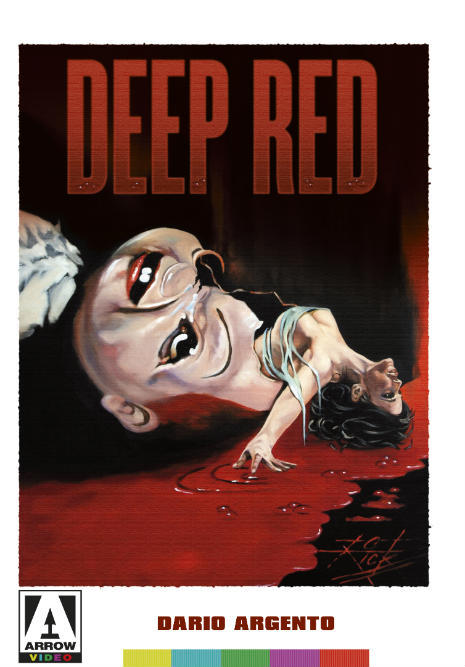
So the thing is, Dario Argento is an artist who, in spite of his notable misanthropy, has given something to the world. He works in what I would call the most complex artistic medium in human history, and for more than a decade, he consistently lives up to its many intricate challenges. Here you have a guy who wakes up one day and says, "You know, I have something to say. I see the world in a certain way, and I need to tell everyone about it. I'm going to shoot a movie that's really going to make people feel something." And he does. He makes PROFONDO ROSSO, a perfect film. He really cares about it. Every single thing is just so. He takes these absurd miniature tableaus, and photographs them in a way that transforms them into another universe. He makes you feel like you're seeing the color red for the first time. He positions flashy modernity against grave antiquity, and seductive trash against high art, creating juxtapositions that communicate vividly about the dazzling contradictions in the very soul of Rome. This dichotomy is mirrored in his main character, a nervy but vulnerable pianist who has to hide his full artistic sophistication, lest he lose his job playing in seedy dives. This being a giallo, he witnesses a mysterious murder, the key to which is buried in his own memories--he himself becomes the only substantial evidence of the crime, and he is forced to live out his life in an escalating nightmare until he gathers enough context to make meaning out of what he knows. PROFONDO ROSSO is indeed profound and savage, offering reflexive commentary on its own existence as a primal and salacious piece of entertainment that is executed with almost impossible elegance and wisdom. Dario Argento is an artist who recognized the full multifaceted power of cinema, and then with great deliberation, fashioned this gift to the world.
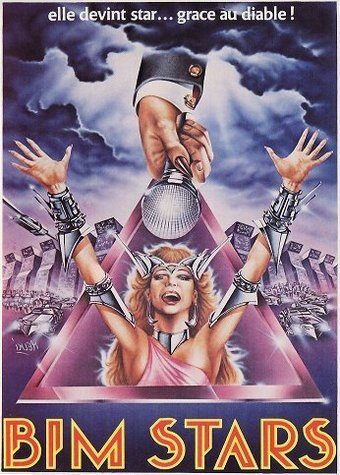
Meanwhile, this same world also contains a guy like Menahem Golan. Golan may be forgivable as the crass commercialist behind the Cannon Group, who shat out a number of dusty-looking vehicles for goons like Chuck Norris and Sylvester Stallone. However, nothing forgives THE APPLE. Nothing even explains it. It appears to be marketed to no one at all, being that no human being who has ever walked the earth could derive pleasure from it. While it may be hard to imagine possessing Argento's talent, it's easy to imagine him contemplating the vast potential of cinema, identifying its prismatic means of expression, and approaching it with both the humility and the courage to make of it something flawless. He does due diligence. He is responsible. He may injure his audience with his brutality, but he’ll never hurt their eyes. It is in no way so easy to even begin to estimate what Menahem Golan was thinking when he dreamed up this grueling fundamentalist christian sci-fi fantasy in which a pair of dopey Adam and Eve-like folk singers tries to save the distant future of 1994 from a literal disco inferno. This dystopian fable, apparently shot in the mass transit hubs of West Berlin, describes a world that has been taken over by a tyrannical music production company-cum-government, Boogalow International Music. The defining characteristic of its rule is enforced disco dancing. The viewer will never find out what is gained by all this disco dancing, or what else this company/government does; there is almost no apparent violence, physical or institutional, and there seem to be no consequences for the disco-averse other than that they are occasionally fined for failing to wear their "BIM marks" (a sort of "mark of the beast" that's obviously just a dead stock skate sticker). BIM's worst crime is trying to turn cherubic hippie chick Bibi into a disco diva, while keeping her apart from her beloved folksy musical partner Alphie. The action culminates with the lovebirds running away to live with a bunch of dirty hippies who leave unattended fires burning all over the public park where they live, and who are presently rescued by a godlike intergalactic being (or just god, but he flies around in outer space, I have no fucking idea) in a white tuxedo, who ferries them all off to another planet in his flying Rolls Royce.
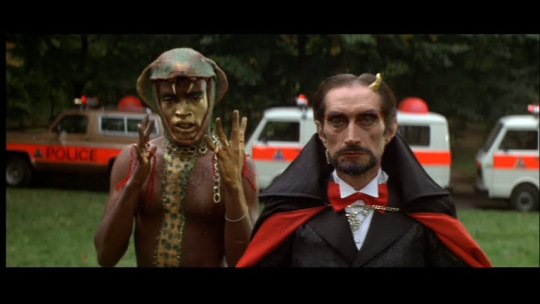
That is how THE APPLE resolves itself. It's almost a feat in and of itself that, in spite of being based so transparently on the story of the Garden of Eden and certain parts of the Book of Revelations, THE APPLE manages to have no clear message whatsoever. There's a tenuous thing about how it's good for people to love each other, but it's impossible to imagine what BIM's point is, why they care whether or not people love each other, why they oppress people, how they oppress people, and what happens if you defy them, other than that you get a ticket and someone chases you out of the civic space that you're vandalizing. Besides that, the movie is simply bad in every single way. The music is the worst you'll ever hear, vacillating between being purely idiotic, and being militantly offensive, as in the case of a reggae number comparing the rule of BIM to the American slavery period. The costumes are beyond ugly, leaving every single character looking like they've been scribbled on and thrown in the garbage by an angry child. At a certain point, THE APPLE seems to be meticulously checking off a list of things that no person would ever wish to see in a movie, from filthy gangs of sack-clad children shrilly repeating nonsense lines, to warty old jewish stereotypes being sexually molested while they spoon-feed unctuous folk singers a greasy-looking stew
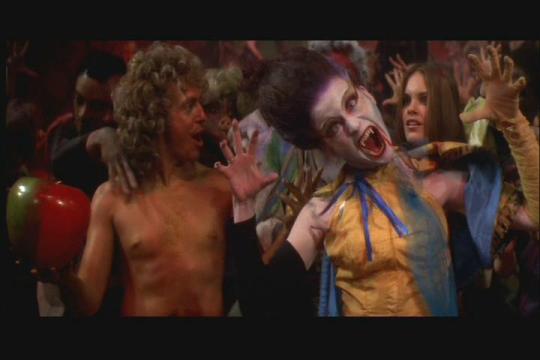
The film is so hideous in every dimension that you wouldn't even take a picture of it if it were happening in front of you. It's bad enough that the people who collaborated on this movie actually did any of what you see on the screen even one single time, without someone actually deciding to record the whole thing and distribute it to the world at large. What I'm essentially trying to say is, on the same planet in the same timeline, you can somehow have a person like Dario Argento, considerately and patiently crafting an incomparable work of art that speaks to the artist's economic and historical context--and you can also have someone like Menahem Golan, who can't even figure out how to make meaning out of the fucking Bible, who has the fucking nerve to shoehorn a bunch of degenerates into grimy leotards and make them twirl batons in a world covered in shitty stickers, and he calls that a fucking movie. He charges money for people to see it. It is literally maddening to even try to imagine what would motivate all this wasted motion, the product of which is so aesthetically and emotionally destructive that it is actually evil. It can be evil, to make a bad movie. This is the one and only lesson of THE APPLE.
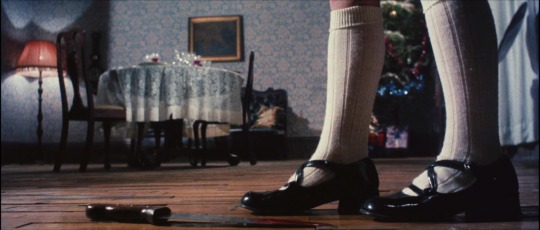
PS I've seen THE APPLE like a hundred times so I guess I actually love it in some perverted way, I mean I'm not above it. Just, something had to be said.
#blogtober#deep red#the hatchet murders#profondo rosso#dario argento#the apple#men ahem golan#menahem golan#musical#sci-fi#fantasy#religion#giallo#horror#thriller
18 notes
·
View notes
Text
Covenant Faith - Lesson 12, June 12-18
Sabbath Afternoon
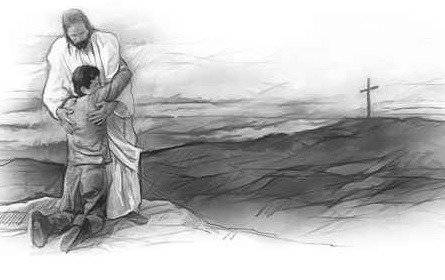
Read for This Week’s Study: Gal. 6:14; Rom. 6:23; I John 5:11, 13; Rom. 4:1-7; Lev. 7:18; Lev. 17:1-4; Rom. 5:1.
Memory Verse: “But that no man is justified by the law in the sight of God, it is evident: for, The just shall live by faith” (Galatians 3:11).
About seven centuries before Christ, the poet Homer wrote the Odyssey, the story of Odysseus the great warrior who — after sacking the city of Troy in the Trojan war — began a ten-year voyage to try to return to his native Ithaca. The voyage, too, took so long because he faced shipwrecks, mutinies, storms, monsters, and other obstacles that kept him from reaching his goal. Finally, after deciding that Odysseus had suffered enough, the gods agreed to allow the weary warrior to return to his home and family. His trials were, they agreed, enough atonement for his mistakes.
In one sense, we are like Odysseus, on a long journey home. The crucial difference, however, is that, unlike Odysseus, we can never “suffer enough” to earn our way back. The distance between heaven and earth is too great for us to atone for our mistakes. If we get home, it would have to be only by the grace of God.
The Week at a Glance: Why must salvation be a gift? Why could only Someone equal with God ransom our souls? What makes Abraham such a good representative of faith? What does it mean that righteousness is “imputed” or “credited” to us? How can we make the promises and hope found in the Cross our own?
Study this week’s lesson to prepare for Sabbath, June 19.
Sunday, June 13
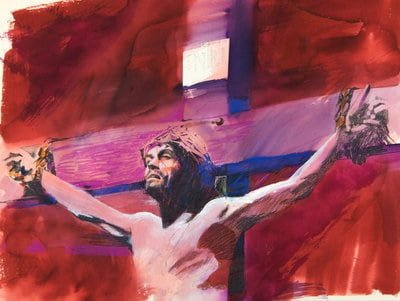
Reflections of Calvary
The Old Testament way of salvation under the Mosaic covenant is no different from the New Testament way of salvation under the new covenant. Whether in the Old or New Testament, old or new covenant, salvation is by faith alone. If it was by anything else, such as works, salvation would be something that was owed us, something the Creator was obligated to give us. Only those who do not understand the seriousness of sin could believe that God was under some obligation to save us. On the contrary, if anything, there was only one obligation, and that was what we owed to the violated law. We, of course, could not meet that obligation; fortunately, Jesus met it for us.
“When men and women can more fully comprehend the magnitude of the great sacrifice which was made by the Majesty of heaven in dying in man’s stead, then will the plan of salvation be magnified, and reflections of Calvary will awaken tender, sacred, and lively emotions in the Christian’s heart. Praises to God and the Lamb will be in their hearts and upon their lips. Pride and self-esteem cannot flourish in the hearts that keep fresh in memory the scenes of Calvary … All the riches of the world are not of sufficient value to redeem one perishing soul. Who can measure the love Christ felt for a lost world as He hung upon the cross, suffering for the sins of guilty men? This love was immeasurable, infinite.
Christ has shown that His love was stronger than death. He was accomplishing man’s salvation; and although He had the most fearful conflict with the powers of darkness, yet, amid it all, His love grew stronger and stronger. He endured the hiding of His Father’s countenance, until He was led to exclaim in the bitterness of His soul: ‘My God, My God, why hast Thou forsaken Me?’ His arm brought salvation. The price was paid to purchase the redemption of man, when, in the last soul struggle, the blessed words were uttered which seemed to resound through creation: ‘It is finished.’
The scenes of Calvary call for the deepest emotion. Upon this subject you will be excusable if you manifest enthusiasm. That Christ, so excellent, so innocent, should suffer such a painful death, bearing the weight of the sins of the world, our thoughts and imaginations can never fully comprehend. The length, the breadth, the height, the depth, of such amazing love we cannot fathom. The contemplation of the matchless depths of a Saviour’s love should fill the mind, touch and melt the soul, refine and elevate the affections, and completely transform the whole character.” — Ellen G. White, Testimonies for the Church, vol. 2, pp. 212, 213.
Pray over what Ellen G. White wrote here. Keeping these lines in mind, read Galatians 6:14 and then ask yourself, in what ways can I glory in the Cross of Christ?
Monday, June 14
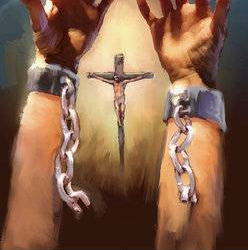
The Covenant and the Sacrifice
“You know that you were ransomed from the futile ways inherited from your fathers, not with perishable things such as silver or gold, but with the precious blood of Christ, like that of a lamb without blemish or spot” (1 Pet. 1:18-19, RSV).
What does Peter mean here when he says that we were ransomed?
When Peter speaks about Christ’s atoning death on the cross, the “ransom” or price idea to which he refers brings to mind the ancient practice of a slave being freed from his bondage after a price had been paid (often by a relative). In contrast, Christ ransomed us from the slavery of sin and its final fruit, which is death, but He did it with His “precious blood,” His substitutionary and voluntary death on Calvary. Again, this is the foundation of all the covenants: without it, the covenant becomes null and void, because God could not have justly fulfilled His end of the deal, which is the gift of eternal life bestowed upon all who believe.
Look up the following verses: Rom. 6:23, 1 John 5:11, 13. What message do all of them share in common?
We have this promise of eternal life, because Jesus alone could repair that breach that first caused us to lose that eternal life. How? Because the righteousness and infinite value of the Creator alone could cancel the debt we owed to the broken law — that is how wide the breach caused by sin was. After all, what would it say about the seriousness of God’s eternal moral law if some finite, temporal, and created being could pay the penalty for violating it? Only Someone who is equal to God Himself, in whom life existed unborrowed and underived and eternal, could have paid the ransom required to free us from the debt owed to the law. This is how all the covenant promises are fulfilled; this is how we have the promise of eternal life, even now; this is how we have been ransomed from sin and death.
Imagine that someone’s child, in an art museum, throws a balloon filled with ink on a Rembrandt painting and ruins it completely. The painting is worth millions; the parents, even if they sold everything they owned, could not come close to paying the debt owed. In what sense does this image help us understand just how serious a breach sin has caused, how helpless we are to fix it, and why only the Lord Himself could pay the debt?
Tuesday, June 15
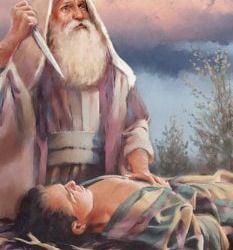
The Faith of Abraham: Part 1
“He believed in the LORD; and he counted it to him for righteousness” (Gen. 15:6).
This verse remains one of the most profound statements in all Scripture. It helps establish the crucial truth of biblical religion, that of justification by faith alone, and it does this long centuries before Paul wrote about it in Romans. All of which helps prove the point that from Eden onward, salvation always came the same way.
The immediate context of the verse helps us understand just how great Abram’s faith was, believing in God’s promise of a son despite all the physical evidence that would seem to make that promise impossible. It is the kind of faith that realizes its own utter helplessness, the kind of faith that demands a complete surrender of self, the kind of faith that requires a total submission to the Lord, the kind of faith that results in obedience. This was the faith of Abram, and it was counted to him “as righteousness.”
Why does the Bible say that it was “counted to” him or “credited to” him as righteousness? Was Abram himself “righteous” in the sense of God’s righteousness? What did he do, not long after God declared him righteous, that helps us understand why this righteousness was credited to him, as opposed to what he himself actually was?
However much Abram’s life was a life of faith and obedience, it was not a life of perfect faith and perfect obedience. At times he displayed weakness in both areas. (Does that sound like anyone you know?) All of which leads to the crucial point, and that is: the righteousness that saves us is a righteousness that is credited to us, a righteousness that is (to use a fancy theological term) imputed to us. This means that we are declared righteous in the sight of God, despite our faults; it means that the God of heaven views us as righteous even if we are not. This is what He did with Abram, and this is what He will do to all who come to Him in “the faith of Abraham” (Rom. 4:16).
Read Romans 4:1-7. Look at the context in which Paul uses Genesis 15:6. Pray over those verses and write out in your own words what you believe they are saying to you.
Wednesday, June 16
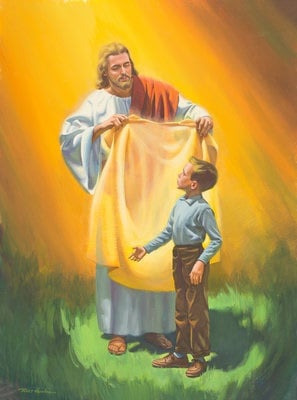
The Faith of Abraham: Part 2
Looking again at Genesis 15:6, we can see that various translations have rendered the term counted (Hebrew, chashab) or “reckoned” or “credited” (RSV, NIV) or “accounted.” (NKJV)
The same term is employed in other texts in the books of Moses. A person or a thing is “reckoned” or “regarded" as something that person or thing is not. For instance, in Genesis 31:15, Rachel and Leah affirm that their father “reckons” (“regards” or “counts”) them as strangers, although they are his daughters. The tithe of the Levite is “reckoned” (“regarded” or “counted”) as though it were the corn of the threshing floor, although it is obviously not the corn (Num. 18:27, 30, NIV).
How is the idea of reckoning expressed in the context of sacrifices? (Lev. 7:18, Lev. 17:1-4).
The King James Version uses the word imputed to translate chashab. If a particular sacrifice (“peace offering”) is not eaten by the third day, its value is lost, and it shall not be “reckoned” (Lev. 7:18, NASB; Hebrew, chashab) to the benefit of the offerer. Leviticus 7:18 speaks of a situation in which a sacrifice is “reckoned” to the benefit of the sinner (compare Lev. 17:1-4, NASB) who then stands before God in righteousness. God is accounting the sinner as righteous, although the individual is actually unrighteous.
Take some time to dwell on this wonderful truth that we, despite our faults, can be accounted, or credited, as righteous in the sight of God. Write out in your own words your understanding of what this means.
The great truth, that of being declared righteous, not because of any act that we can do but only because of faith in what Christ has done for us, this is the essence of the phrase “righteousness by faith.” Yet, it is not that our faith itself makes us righteous; rather, faith is the vehicle by which we obtain the gift of righteousness. This, in essence, is the beauty, the mystery, and the glory of Christianity. All that we believe as Christians, as followers of Christ, finds an important root in this wonderful concept. Through faith, we are accounted righteous in the sight of God. All else that follows; obedience, sanctification, holiness, character development, love, should stem from this crucial truth.
How do you respond to someone who seeks to be a Christian yet says, “But I don’t feel righteous”?
Thursday, June 17
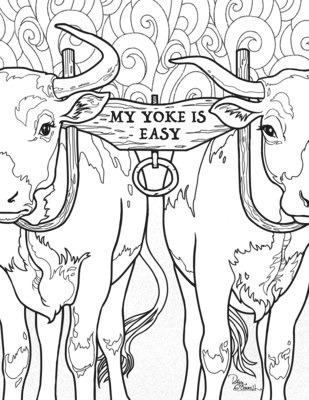
Resting on the Promises
There is a story told about the famous Cardinal Bellarmine, the great Catholic apologist who all his life fought the message of justification by an imputed righteousness alone. As he lay dying, he was brought the crucifixes and the merits of the saints to help give him assurance before death. But Bellarmine said, “Take it away. I think it’s safer to trust in the merits of Christ.”
For many people as they near the end of their lives, they look back and see how vain, how futile, how useless their deeds and their works are for earning salvation with a holy God, and thus how much they need the righteousness of Christ.
Yet the good news is that we don’t have to wait for the approach of death to have security in the Lord now. The whole covenant is based on the secure promises of God now, promises for us now, promises that can make our life better now.
Look up the following verses and answer the question asked with each one in the context of developing, keeping, and strengthening your covenant relationship with God:
Ps. 34:8 (How can you taste God’s goodness?)
Matt. 11:30 (What is it about what Christ has done for us that makes this yoke easy?)
Rom 5:1 (What does justification have to do with peace?)
Phil. 2:7-8 (What have you gained from Christ’s experience?)
Prayerfully examine your life and ask yourself, what things am I doing that are strengthening my relationship with God, and what things are hurting it? What changes do I need to make?
Friday, June 18
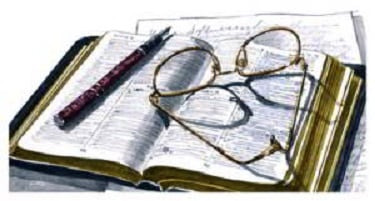
Further Thought:
“The only way in which he [the sinner] can attain to righteousness is through faith. By faith he can bring to God the merits of Christ, and the Lord places the obedience of His Son to the sinner’s account. Christ’s righteousness is accepted in place of man’s failure, and God receives, pardons, justifies, the repentant, believing soul, treats him as though he were righteous, and loves him as He loves His Son. This is how faith is accounted righteousness.” — Ellen G. White, Selected Messages, book 1, p. 367.
“When through repentance and faith we accept Christ as our Savior, the Lord pardons our sins, and remits the penalty prescribed for the transgression of the law. The sinner then stands before God as a just person; he is taken into favor with Heaven and through the Spirit has fellowship with the Father and the Son.
Then there is yet another work to be accomplished, and this is of a progressive nature. The soul is to be sanctified through the truth. And this also is accomplished through faith. For it is only by the grace of Christ, which we receive through faith, that the character can be transformed.” — Ellen G. White, Selected Messages, book 3, p. 191.
Discussion Questions:
1. What distinction is made between a living and a dead faith? (James 2:17-18). How does Paul describe a living faith? (Rom. 16:26). What is the key word that helps reveal what faith entails?
2. How do you respond to the argument (which comes with a certain logical consistency) that if we are saved only by a credited righteousness, not a righteousness that exists within us, then it does not matter what we do or how we act?
3. “Our acceptance with God is sure only through His beloved Son, and good works are but the result of the working of His sin-pardoning love. They are no credit to us, and we have nothing accorded to us for our good works by which we may claim a part in the salvation of our souls … He [the believer] cannot present his good works as a plea for the salvation of his soul.” — Ellen G. White, Selected Messages, book 3, p. 199. Keeping this statement by Ellen G. White in mind, why, then, are good works such a crucial part of the Christian experience?
Summary: Old Covenant, new covenant: Jesus paid the debt owed by the law, so that we can stand righteous in the sight of God.
0 notes
Text
31 Genre Show Producers on the Heart of Their Series
Over the last month, executive producers of more than 30 current genre shows have taken part in Yahoo TV’s “Why Genre Shows Matter” survey, either via email or by phone. We’ve learned which genre show was the first to resonate with them, which genre show they believe deserved more Emmy love, which current genre show they think is tackling an issue well, and, if they were a Buffy the Vampire Slayer fan, what moment, episode, or arc best explains why in honor of the show’s 20th anniversary.
Our final question to them: What is the issue you’re proudest of tackling, or most invested in, on your own show? Read on for their answers.
Related: Yahoo TV’s Complete “Why Genre Shows Matter” Coverage
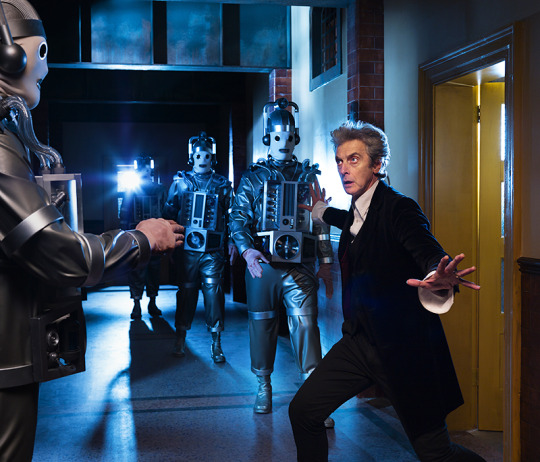
Brian Minchin (BBC America’s ‘Doctor Who’)
The Doctor sees horrors in the universe and faces them with kindness and understanding. (While reserving the right to blow things up if required). That standpoint goes into everything, and is hugely valuable. I love that children watch a hero do that. (Credit: BBC America)
Source: Yahoo TV
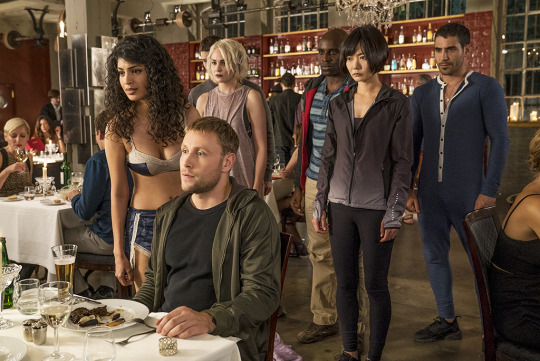
J. Michael Straczynski (Netflix’s ‘Sense 8’)
We designed Sense8 to say that regardless of where we are born, what our ethnic background, gender or sexuality might be, we are more alike than we are different, that what unites us is stronger than what divides us, and that the common coin of our shared humanity trumps the forces that would set us at each others’ throats. At a time when we are being tribalized and factionalized and marginalized as never before, we felt that was an important message to convey, and it’s only become more relevant and vital in the last year or so. (Credit: Netflix)
Source: Yahoo TV
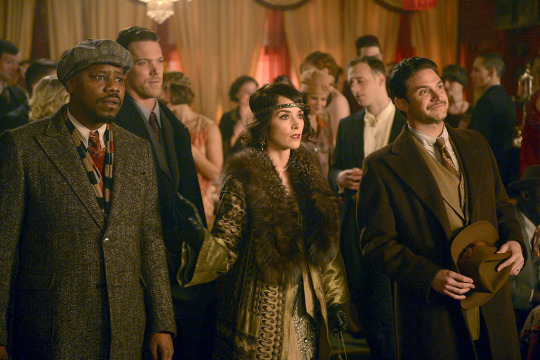
Eric Kripke (NBC’s ‘Timeless’)
I’m really proud of how Timeless shines a light on some of the lesser known stories in history, often involving the heroic contributions of women and minorities. I’m proud of how we’ve established ourselves as a warm, multi-ethnic, inclusive view of history. Because one, it’s the truth, and two, America’s history should be for everyone. (Credit: Sergei Bachlakov/NBC)
Source: Yahoo TV
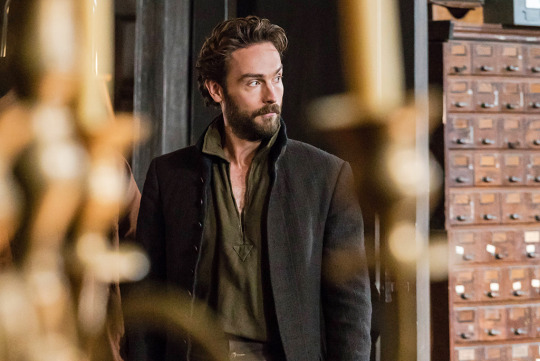
Albert Kim (Fox’s ‘Sleepy Hollow’)
This season on Sleepy Hollow, Ichabod Crane has gone head-to-head with a villain who believes that America has failed as a social and political experiment and that tyranny is how the country needs to move into the future. Which means Crane has been forced to defend the ideals of the country he helped establish over two centuries ago. It’s a situation that’;s allowed us to explore the question: What makes America America? Through that lens, we’ve looked at the stories of real historical figures like Benjamin Banneker, a Revolutionary War-era African American surveyor and engineer who knew that when Thomas Jefferson wrote the phrase, “All men are created equal,” it sadly didn’t apply to everyone. Now, more than ever, seems to be a good time to be bringing up issues like this, even in a fictional context. (Credit: Tina Rowden/Fox)
Source: Yahoo TV
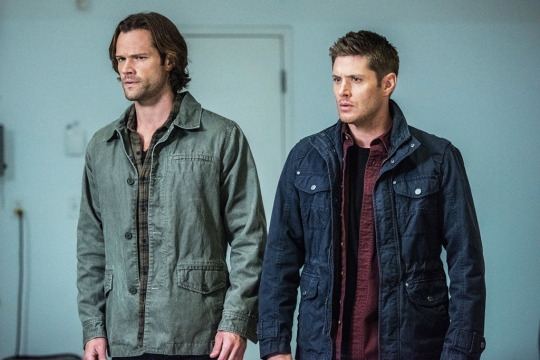
Robert Singer (The CW’s ‘Supernatural’)
I think as the show has matured, we’ve become very conscious of the idea that world is not black and white, and that the shades of gray in this life are not easy to deal with, but it is important to try. Sam and Dean have certainly, over time, found their moral center, and because of this they try very hard not to see the world in just black or white. This season, with The British Men of Letters, who do view the world in black and white, has given our leads moral challenges which for the most part they have been up to handling. When they haven’t been up to the task, the lessons learned from these episodes have been profound. I think the best genre shows try to do this, and while good lessons learned are very valuable, it also makes for better storytelling. (Credit: Dean Buscher/The CW)
Source: Yahoo TV
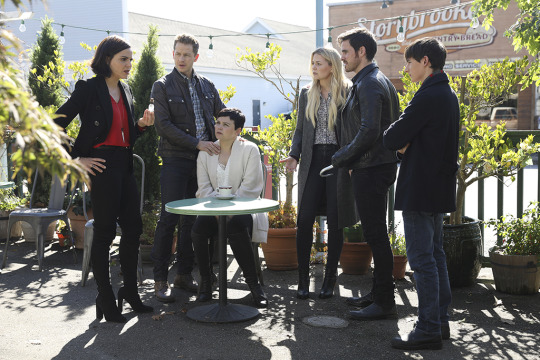
Adam Horowitz and Edward Kitsis (ABC’s ‘Once Upon a Time’)
There’s a saying on our show that we keep coming back to: “Evil isn’t born, it’s made.” Once Upon a Time is at its core a show about hope and optimism. We like to believe that the world is filled with good and when evil does rear its head it’s because circumstance conspired to create it. And if circumstance can create evil, then those same circumstances can be defeated, and the best of humanity can win out in the end. (Credit: Jack Rowand/ABC)
Source: Yahoo TV
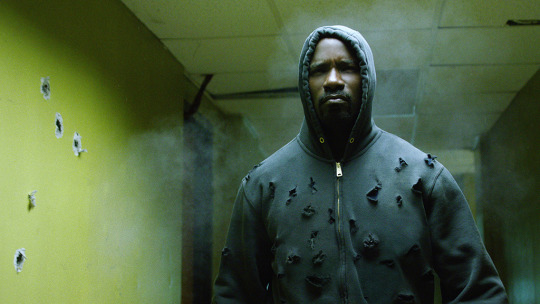
Cheo Hodari Coker (Netflix’s ‘Luke Cage’)
I love the fact that we have two black male characters that you’ve never seen before. You’ve never seen a burly 240-lb. black man that can throw stuff that’s also a bookworm, and you’ve never seen a musician that’s a gangster. And the fact that you have a gangster that is really just a frustrated musician is interesting. And what Simone Missick did with Misty Knight or what Alfre [Woodard] did incredibly with Black Mariah, I mean, it’s just next level… All Blaxploitation is, is the opportunity for an African-American cast or lead actor or actress to do the same things that a white action hero gets to do… The reason that Shaft has a dominant theme song is because James Bond has a dominant theme song… I wanted the show to not be embarrassed by the Blaxploitation roots, but embrace it. Then at the same time, open up the camera, so to speak — widen the aperture — to include other genres. I mean, honestly, what Luke Cage; it’s a hip-hop Western. And you have Luke Cage as the sheriff of Harlem. He’s basically Shane. He’s Shane or he’s any number of reluctant heroes as played by Clint Eastwood. (Credit: Netflix) Read our full conversation with Coker.
Source: Yahoo TV
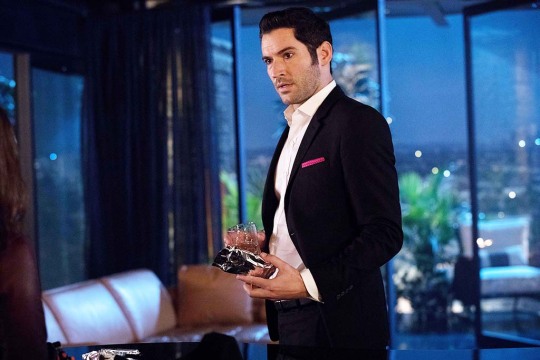
Joe Henderson (Fox’s ‘Lucifer’)
In the second episode of the show, we established that our lead male character is bisexual, which I think is pretty rare on network TV. We worried the studio and network might push against it, but instead, they championed it. And when I mentioned it to Tom (Ellis, Lucifer himself) he just shrugged. “Well of course he is.” When it aired, the only reaction was positive. I’m proud that what we thought might be pushing boundaries/creating controversy was instead welcomed as normal. Because of course it is. (Credit: Jack Rowand/FOX)
Source: Yahoo TV
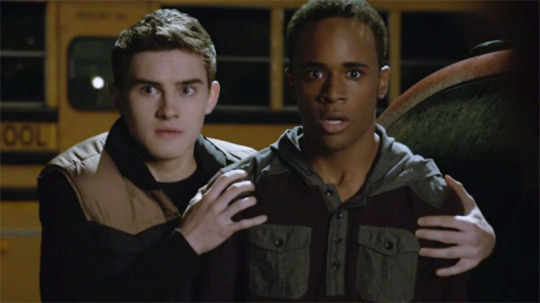
Jeff Davis (MTV’s ‘Teen Wolf’)
The idea of inclusion on Teen Wolf has always been something for which we strive. We’ve heard from fans that how being gay is treated so nonchalantly in the world of Teen Wolf has been something they’ve loved most about the show. (Credit: MTV)
Source: Yahoo TV
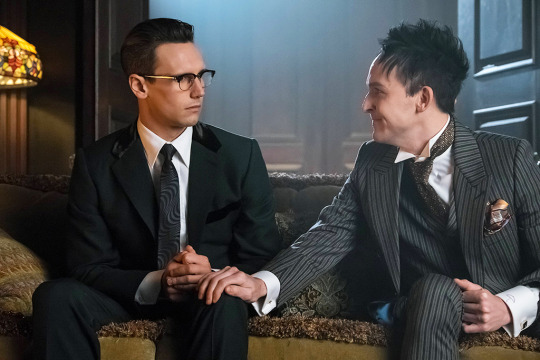
Ken Woodruff (Fox’s ‘Gotham’)
The story I’m proudest of is from this season (Season 3). We were able to take a popular character from the canon of DC Comics, Penguin, and tell a personal, real, heartbreaking love story between him and another male character, Edward Nygma. (Credit: Jeff Neumann/FOX)
Source: Yahoo TV
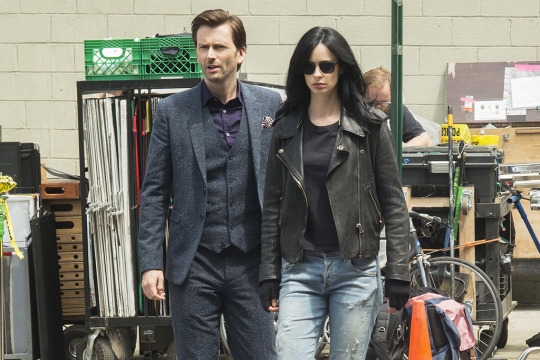
Melissa Rosenberg (Netflix’s ‘Jessica Jones’)
In the comic books, Jessica wasn’t actually raped — she was an imprisoned voyeur to it, and we just wanted to make it a more personal experience and more realistic. We really were just telling the story of this character and never said, “Okay, we’re going to tackle the issue of rape or domestic violence or any issue like that.” We’re just going to tell her story and be responsible about it and be honest with the character. And so when it aired, there were initially all these think pieces on how it addressed rape and domestic violence. And then we were like, “Yes, that’s exactly what we intended to do!” Obviously we were dealing with an issue, but we never approached it that way. The minute you step on a soapbox is the minute people stop listening to you. (Credit: Netflix) Read our full conversation with Rosenberg and The Magicians showrunner Sera Gamble.
Source: Yahoo TV
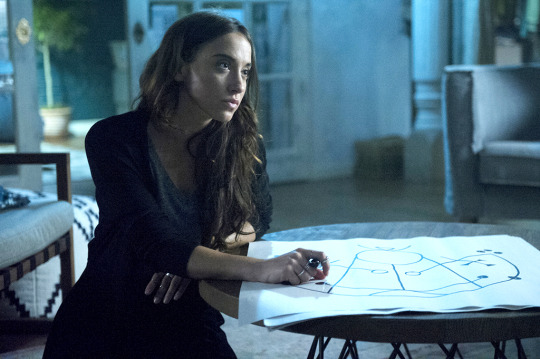
Sera Gamble (Syfy’s ‘The Magicians’)
We felt that sexual assault was really the core of the Magicians story. The reveal that the Big Bad [The Beast] evolved into a monster as a defense mechanism to protect himself because he was being sexually abused as a young boy struck my partner, John McNamara, and me as a really amazing use of fantasy, and it felt psychologically real. It was non-negotiable for us. We really wanted to tell that story. It kind of became the guiding mechanism for the whole show; just the idea that fantasy is used to explore darkness and the human psyche and the various evils that we do to one another and to human beings. When we got to [where] Julia is assaulted by a trickster god, it’s a very graphic rape scene. What was important to us was to be honest and unflinching about it. We didn’t want to find any trapdoors that we could go through that made it less personal for the audience. So for example, we could have made the creature that assaulted her look less human and we chose not to. We wanted him to feel as human and present in the room as possible. Most important for us, when we filmed that scene, was to stay in Julia’s point of view, to make sure we were telling her story, and that she never became the object of the story. She was always the subject of the story. (Photo by: Carole Segal/Syfy) Read our full conversation with Gamble and Jessica Jones showrunner Melisssa Rosenberg.
Source: Yahoo TV
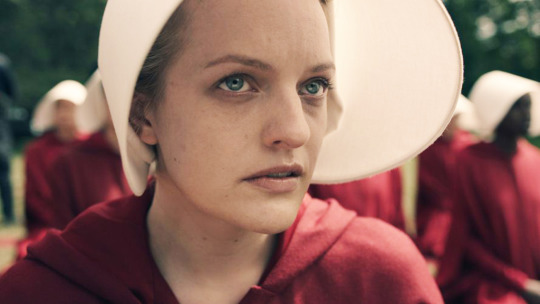
Bruce Miller (Hulu’s ‘The Handmaid’s Tale’)
I’m proudest of the way the show deals with institutionalized sexism and misogyny. The show takes place in an alternative present where women are commodified and strictly oppressed under threat of violence. In a world like this it’s easy to get lost in categories, i.e. victims, collaborators, oppressors, but I’m proud of how our show tries to humanize everyone in Atwood’s Gilead. (Credit: Take Five/Hulu)
Source: Yahoo TV
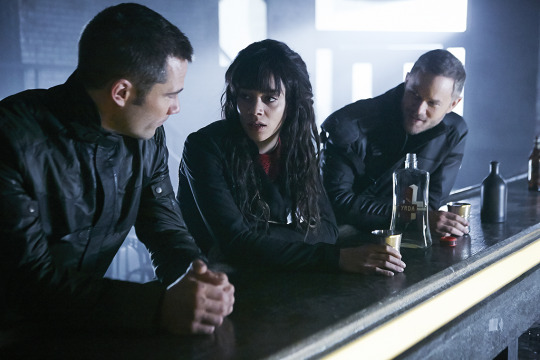
Michelle Lovretta (Syfy’s ‘Killjoys’)
Consent and agency are important themes in most of my work, and are also just a natural fit when dealing with science fiction, especially as a woman. In Killjoys, a lot of our long arcs are about systems trampling on the rights of individuals… and then we sit back, crack a beer, and have fun watching how our smartass underdogs win out. (Credit: Ian Watson/Syfy/Killjoys II Productions Limited)
Source: Yahoo TV
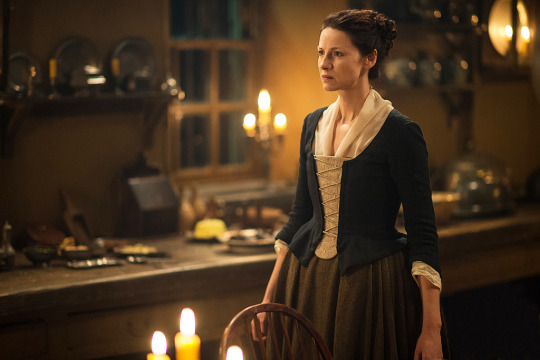
Ronald D. Moore (Starz’s ‘Outlander’)
I’m proud of the way we depict our heroine as a smart, strong woman who is able to adapt to living in the past without losing her sense of self. She’s not a damsel in distress and she’s often the one to come to the rescue of the man she loves. (Credit: Starz)
Source: Yahoo TV
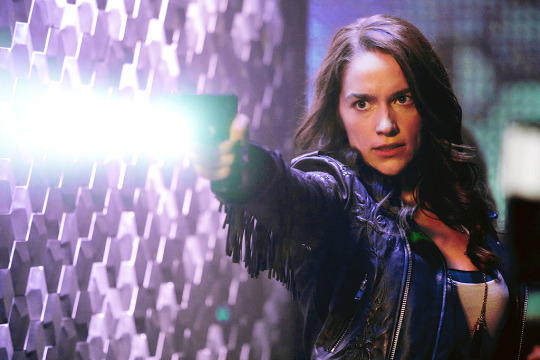
Emily Andras (Syfy’s ‘Wynonna Earp’)
I’m very proud of the female representation on Wynonna Earp — has there ever been a western with more women running around firing guns and kicking ass? — and I like to think we handled the LGBT storyline delicately with grace and good spirit. (Credit: Michelle Faye/Syfy/Wynonna Earp Productions)
Source: Yahoo TV
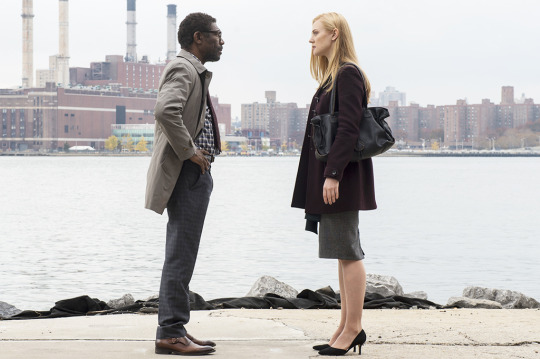
Marco Ramirez (Netflix’s ‘Daredevil’)
From the beginning, Daredevil has been concerned with characters who uncover truth, whether through vigilante activity or journalistic integrity. The Ben Urich story, which then became Karen Page’s story, is something that seems to take on a new and different meaning every year. Season 1, it was about taking down Wilson Fisk. Season 2, it became about uncovering the truth behind the murder of Frank Castle’s family. Maybe it’s The X-Files still in my DNA, but “the truth is out there” is a hell of a dramatic motor in TV. (Credit: Barry Wetcher)
Source: Yahoo TV
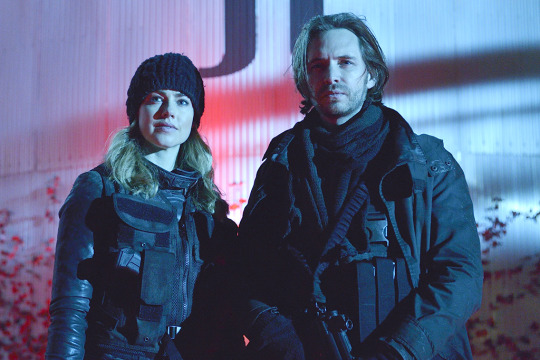
Terry Matalas (’12 Monkeys’)
12 Monkeys is pretty morally gray, through and through — which gives us great latitude to explore things like blind faith in any kind of doctrine. We delve into how one can be driven to do terrible things: Fear. Love. Faith. (Credit: Ben Mark Holzberg/Syfy)
Source: Yahoo TV
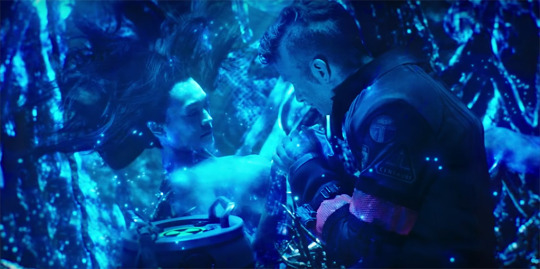
Mark Fergus (Syfy’s ‘The Expanse’)
You’ve got these middle-aged guys who have lived badly, or if they had convictions they lost them, they tripped and fell in life and they’re trying to find a way back to the light… That’s the story we gravitate to because I feel like we have something to say about that. It’s Children of Men, it’s Tony Stark, it’s Rick from Casablanca, it’s The Verdict. [In Season 2’s “Home”] Miller felt like his whole life had been the fabric leading him up to this moment, so the fact that he was a f–kup his whole life actually helped him in the moment where he needed to redeem himself. That final scene with Julie, that was the reason we wanted to make this show. That was the whole heart of it. It’s not only the heart of the book, I think it’s the heart of the whole show. (Credit: Syfy) Read our full conversation with Fergus.
Source: Yahoo TV
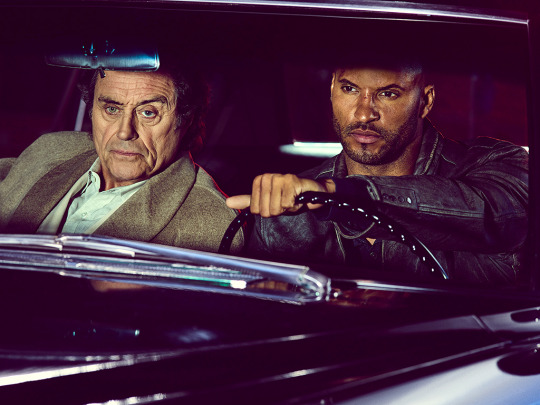
Bryan Fuller and Michael Green (Starz’s ‘American Gods’)
Fuller: We’re very proud of the coming-to-America stories. We told them because we were very moved by them as reminders of how we all got here. And when we made them, we thought everyone would be moved by them too and were very surprised to find out by the time it airs — especially after November — those immigration stories have become far more political than we would have ever expected. If people are moved by them, so much the better. If people are challenged by them, that’s there too, and not a bad thing at all. (Credit: Starz) Read our full conversation with Fuller and Green.
Source: Yahoo TV
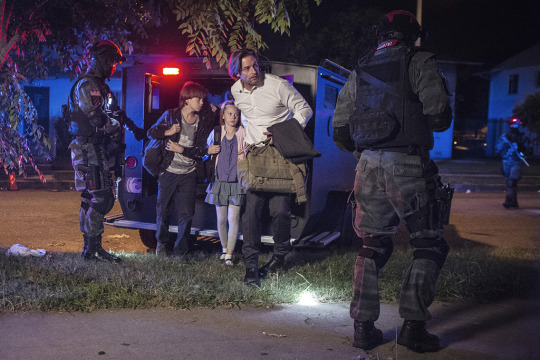
Ryan Condal and Carlton Cuse (USA’s ‘Colony’)
Condal: We’re proudest of the human drama in Colony. The genre, the science-fiction, is just a backdrop that applies the correct pressures (i.e., an alien occupation of Los Angeles) to explore the themes in which we are most interested. This season, there are two particular issues that are addressed that really interested us. In episode 2.04 (“Panopticon”), we dramatize the very real and growing technological surveillance state as it applies to the world of Colony and, in particular, the Bowman family. What happens to a society when it lives in constant fear of being watched? Can anyone trust anyone? The answers are dark and approaching the nihilistic, which is why we were so drawn to it. The other issue is the true nature of resistance. When we think of the word “resistance,” in a science-fiction context, it tends to conjure images of the Rebel Alliance in Star Wars and Sarah Connor in The Terminator. But real resistance is ugly. It’s politically motivated, it’s brutally violent, it is uncompromising, and it is often utterly futile. This is a big theme this season, particularly in the second half, and I think the audience will be surprised about what Colony has to say about the issue. (Credit: Isabella Vosmikova/USA Network)
Source: Yahoo TV
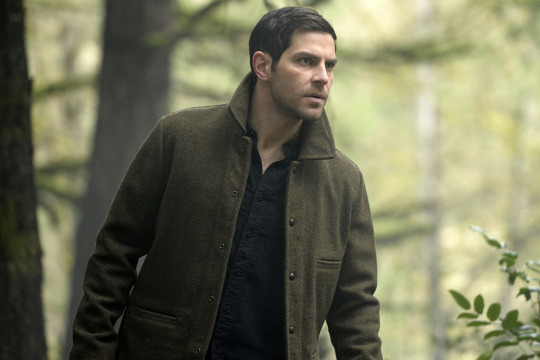
David Greenwalt and Jim Kouf (NBC’s ‘Grimm’)
Greenwalt: Grimm attempts to offer an explanation for monstrous behavior and the inexplicable nature of evil. Kouf: The environmental issue in episode 9 of this season, as the environment is an issue that’s important to me, and the senility issue in episode 10 of this season, as it is an issue we all have to deal with. (Credit: Allyson Riggs/NBC)
Source: Yahoo TV
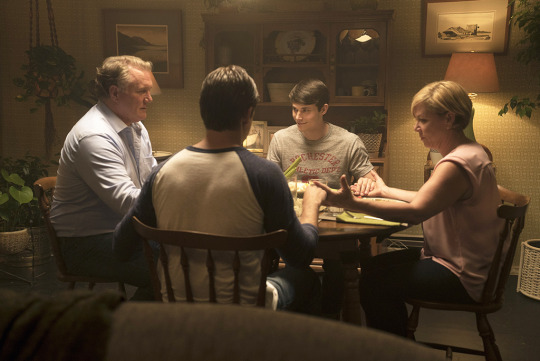
David Eick (Freeform’s ‘Beyond’)
Beyond is interested in how a nuclear family holds together despite extraordinary events, and how growing up and becoming an adult is sort of like learning to be a superhero. (Credit: Katie Yu/Freeform)
Source: Yahoo TV
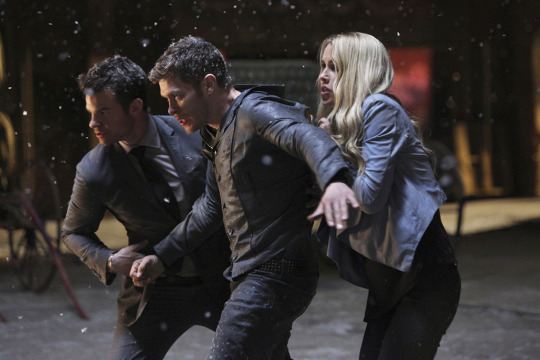
Julie Plec (The CW’s ‘The Originals’)
It’s all about family, for better or for worse, through the good and the bad. It’s about the bonds of blood. And as children of dysfunction and abuse and tyranny, it’s about how these kids grew up to be both the worst parts of that and the best parts of themselves in spite of it all. (Credit: Annette Brown/The CW)
Source: Yahoo TV
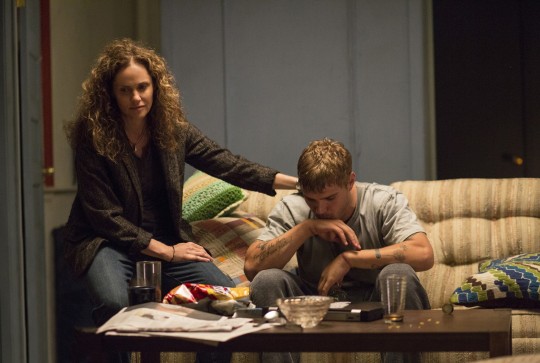
Damon Lindelof (HBO’s ‘The Leftovers’)
I feel most proud of the way our show addresses grief… how surprising and upsetting and nonsensical coping mechanisms can be, whether that mechanism is joining a cult or hiring prostitutes to shoot you in the chest. There is no more profoundly complex human emotion than the one associated with losing someone you love and The Leftovers is a constant examination of that idea. (Credit: HBO)
Source: Yahoo TV
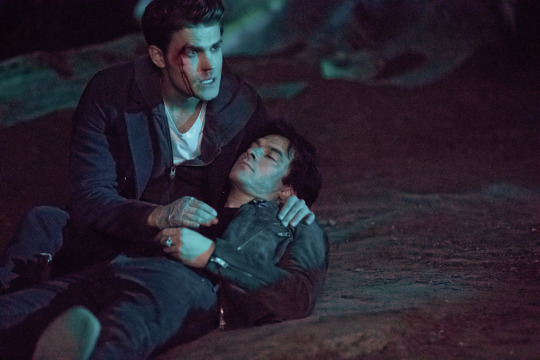
Julie Plec (The CW’s ‘The Vampire Diaries’)
I think that we said a lot that this is a show about love and loss. And those are two extremely universal things that everybody on this planet goes through at one point in their lives. They, with luck, fall deeply in love at least once. Unfortunately, over the course of a lifetime, they experience loss more times than anyone could hope. It’s very difficult for people to express themselves emotionally to deal with those emotions. In the phases of managing and moving on from grief, it’s a very complicated journey. A show that tackles issues of loss and grief, like what we do, is just another tool out there in the universe to let you sit and have a good cry, or to see something about your own experience in this fiction. (Photo: Bob Mahoney/The CW) Read our full conversation with Plec.
Source: Yahoo TV
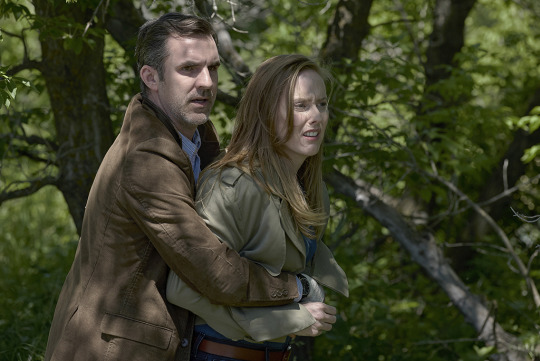
Nick Antosca (Syfy’s ‘Channel Zero’)
Loss and the experience of coping with it, in Channel Zero: Candle Cove. We’re a horror show, and loss is the most universal real world horror. (Credit: Allen Fraser/Syfy)
Source: Yahoo TV
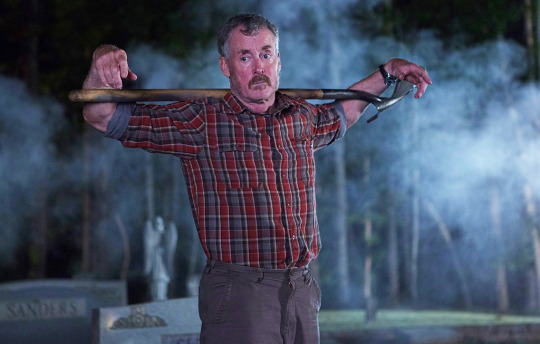
Dana Gould (IFC’s ‘Stan Against Evil’)
Stan Against Evil is largely about moving on after loss. We start Season 1 at the funeral of our lead character’s wife, and by the end of the season, he has only started to come to terms with it. I went through a divorce a couple years ago, and didn’t realize until midway through filming that I had been writing about myself. (Credit: Kim Simms/IFC)
Source: Yahoo TV
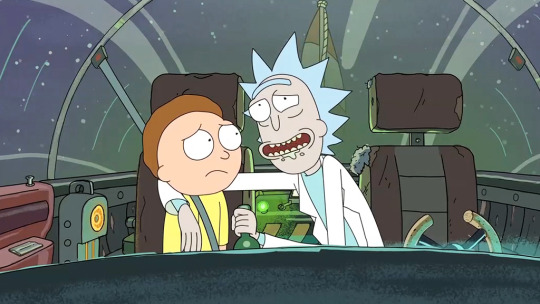
Dan Harmon (Adult Swim’s ‘Rick and Morty’)
I am proud that our show addresses what I consider the root of all our issues: it’s better to have felt an unfeeling universe than never to have felt at all. (Credit: Cartoon Network)
Source: Yahoo TV
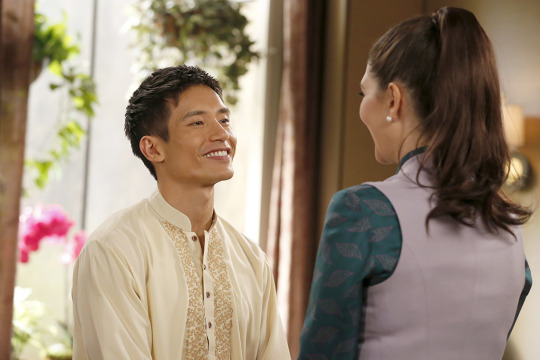
Drew Goddard (NBC’s ‘The Good Place’)
I believe The Good Place is the first show to explore sexual relations between an anthropomorphized afterlife information delivery system and a gentleman from Jacksonville, but it’s possible St. Elsewhere got there first. (Credit: Vivian Zink/NBC)
Source: Yahoo TV
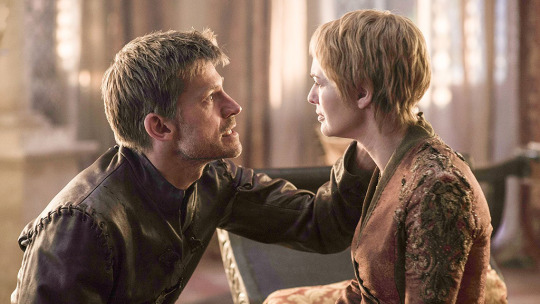
David Benioff and D.B. Weiss (HBO’s ‘Game of Thrones’)
We spend a lot of time pondering the complexities of incestuous relations. Talk about a sticky situation! (Credit: HBO)
Source: Yahoo TV
#Lucifer#Stan Against Evil#Once upon a time#Grimm#_uuid:4606a420-c5ca-39e5-94a9-ec4fb44406fc#Killjoys#Beyond#Why Genre Shows Matter#supernatural#sense8#interviews#channel zero#Gotham#luke cage#Genre EP Questionnaire#Timeless#Jessica Jones#Wynonna Earp#Teen Wolf#12 Monkeys#The Expanse#_revsp:wp.yahoo.tv.us#Rick and Morty#sleepy hollow#American Gods#Doctor Who#The Good Place#_lmsid:a0Vd000000AE7lXEAT#The Originals#The Leftovers
28 notes
·
View notes
Text
The Silver Lining of Charlottesville
With the current political climate and my own left ideology it was a bit challenging to write the title above, but I am sure you are interested to hear me out. Hopefully you are a little concerned maybe even angry at the above title, but let me explain myself. For a very long time I have had a hard time understanding why so many people consider themselves “conservative.” I’ve understood that the Republican base was made of mostly Christians, white people, and the rich. I know the conservative electorate is way more diverse and complicated than the previous sentence, but it’s hard to argue that the GOP does not rely on those voting groups to elect them time and time again. I understand that there are many white Christians living in America and most of them are fine people. They have their key issues like abortion and gay marriage that Republican leaders try to push on such agendas leading the country to a more Christian ideal. I can understand that this mass group of traditional Evangelical Christians is large enough for a party to have a base, but it shouldn’t have as strong as a base to win elections. Not anymore. As for the rich voting Republican, they are mostly “single-issue” votes which is taxes. I should note though that plenty of Americans that are exploited through a capitalist economic system, defend said system, in the name of freedom. Freedom from the big, bad government, our democracy. Unfair wages, outsourcing of jobs and policies that benefit the rich is just normal life as it should be.
I know people don’t feel the same way about Republicans as I do, but I have a feeling more and more will see it my way. I’ve always thought of the Republican base as being mostly white-Evangelical and racist people. Not everyone in the GOP base is a flat-out racist, but you might want to pay attention to how every conservative analyzes Charlottesville and who defends Trump. You might realize that although these people were not there at Charlottesville, they do support racist culture even if it is just to “preserve” our history that we claim we “want to learn from.” I for one don’t believe that so many American’s become instant history buffs when it comes to removing Confederate monuments. They are racist buffs. I feel very comfortable saying all of this. Not all conservatives supported Trump and his comments on Charlottesville, but it is alarming how many of them are failing the very easy test of denouncing Neo-Nazis and White Supremacist. It’s an easy test for us on the left, but you really need to give it some thought on why it’s not so easy for them. I feel that many who call themselves “economic conservatives” or “progressive conservatives” or any sect of the ideology that they are more definitively associated to, are a little queasier about being labeled a conservative. Many of these conservatives can sit by and maybe even work along with people who voted for Trump for change, health care or our economy, but to bring back white nationalism? Who wants to be with those assholes?!!
Well apparently Trump. Donald J. Trump has failed the very easy to ace test of denouncing Neo-Nazis IN A CLEAR AND PROFOUND WAY AND QUICKLY!!! It’s not just him though. Many in his own administration are sympathetic to white nationalist. Steve Bannon, Trump’s chief strategist is one of them. I don’t think we should be too surprised that his administration failed this test, let alone if they received a C-. I am actually watching Fox News these days to see who else will pass or fail this simple test. Many on Fox news are passing it with ease from a teary-eyed Gianno Caldwell to the almost teary eyed and make-up ruining Kat Timpf to Dana Perino and Juan Williams challenging the very dumb Jesse Watters who failed the test. In some ways it gave me hope that not ALL conservatives are hateful racist or even racist sympathizers, but still my racist suspicion of the right has been confirmed when so many on that side seem to not get a lesson most of us learned back in kindergarten.
My hope going forward is the left to use this moment in history to paint social conservatism as this country’s epidemic or plague that must be eradicated and to never return. I actually get excited that Trump and his administration show their true colors about these black and white issues because it will be so much easier for the left to point back at history and say; “Yes that is what you stood for here’s the quote that proves it.” Trump failing the Charlottesville test is not a good thing for the GOP going forward and all this open and blatant racism I hope will make people feel about the Republican party as I have a had for a long time. Hopefully more and more people will come to the conclusion that right-wing politics is not the right direction this country needs to move in especially when we are becoming more diverse and secular. I don’t know, anyone feel like moving to Nazism?
As right-wing politics becomes more and more aligned with white supremacist values, this country eventually needs to reject social conservatism much like the people who were the original Nazis have tried to forget their regrettable past. Today I saw a tweet from Tim Heidecker playing as his right-wing secret agent-character Jack Decker say this: “I’m in Berlin, where’s the Hitler statue?” A smart, simple and good joke that illustrates my point, there aren’t any and for good reason. We still have monuments of hate and it’s been far longer than the 1940’s. Any Republican sticking their neck out for Confederate monuments is castigating themselves as the American Nazi. How can the left use this time in history to springboard the U.S. back in the right direction? We got a lot of ground to cover.
THE PROBLEM
The problem is…. There is no leadership on the left to further expose this component in conservative ideology. The component in which whites come first and after that their work is done. I hear no leaders on the left taking advantage of the right’s ugliness. No strong condemning, no shaming, no exposing the cancer of white nationalism that is taking over the White House. Just a recycled Papa John’s slogan and shrugging their shoulders and asking us “Have We Seen the Other Guys?” That’s it? That’s your leadership? That’s how you’re going to paint a dark cloud over the Conservative establishment that could potentially drive future voting generations from these assholes? I know how we on the left feel about the right, but believe it or not it’s not as obvious of a choice for middle-voters, struggling families and for people who have lost all confidence in Washington.
There’s just this great void on the left and it’s driving me mad. Pelosi and Schumer have got to move over for Senator Corey Booker and others like him. He’s a leader that inspires. Those other two are so Washington I don’t even get excited about them. Left leadership doesn’t need to alienate conservative voters, but it does need to paint an alternative picture of what America can be. They need to put out a message that is so inclusive and positive that in contrast to the evil shit Trump and the party he represents, that any DECENT person would turn to the left. All the tax conservatives and hopefully even some all-moral Christians will have to turn away from the Neo-Nazis and the party they adopted. The only voice on the left is within the media. I have to become inspired or give hope to by the New York Times or the Washington Post as if maybe they will establish their own political parties one day. I doubt that so WHERE THE HELL IS THE LEFT?!!!! The God-Damn sugar-coated Republicans also known as DEMOCRATS!!!
I understand many of you are shaking your heads at me saying “no Alek, you’re wrong, the world is not black and white, and not all conservatives are racist.” I agree with that, but the left can still make it clear to Americans that the more conservative leaders we elect the more likely this shit will happen. This is not a lesson we should be learning again today. That racial supremacy in any form is a horrible thing let alone when whites do it. The left doesn’t need to yell about how horrible the right is, but be leaders for something. Gain some God-damn charisma!! No more “we’re going to pass some sensible, by-partisan gun-control legislation for all Ameri…..ZZZZzzzzzzz.” How about, and I stole this from Jim Jeffries and his show; “GRAB THOSE GUNS!!!” As a liberal I’m becoming discouraged from this very apparent intensity gap between the left and the right. At lease you now where the right is coming from: hate. The left: leadership with soft stances, shrugs, pc talk and old pizza slogans? My God, I’m this close to personally endorsing Booker and Michael Moore of all people for the 2020 ticket, at least they stand for something. At least then we would have some teeth and conviction. You know…. Leadership.
0 notes